- Details
- Written by Andrielli Gianluca
ANNO ACCADEMICO 2023-2024
26-06-2024Seminario
High-resolution transcriptomics techniques as proficient tools to study Unconventional T cells in gut homeostasis and disease
Dott.Alberto Baeri
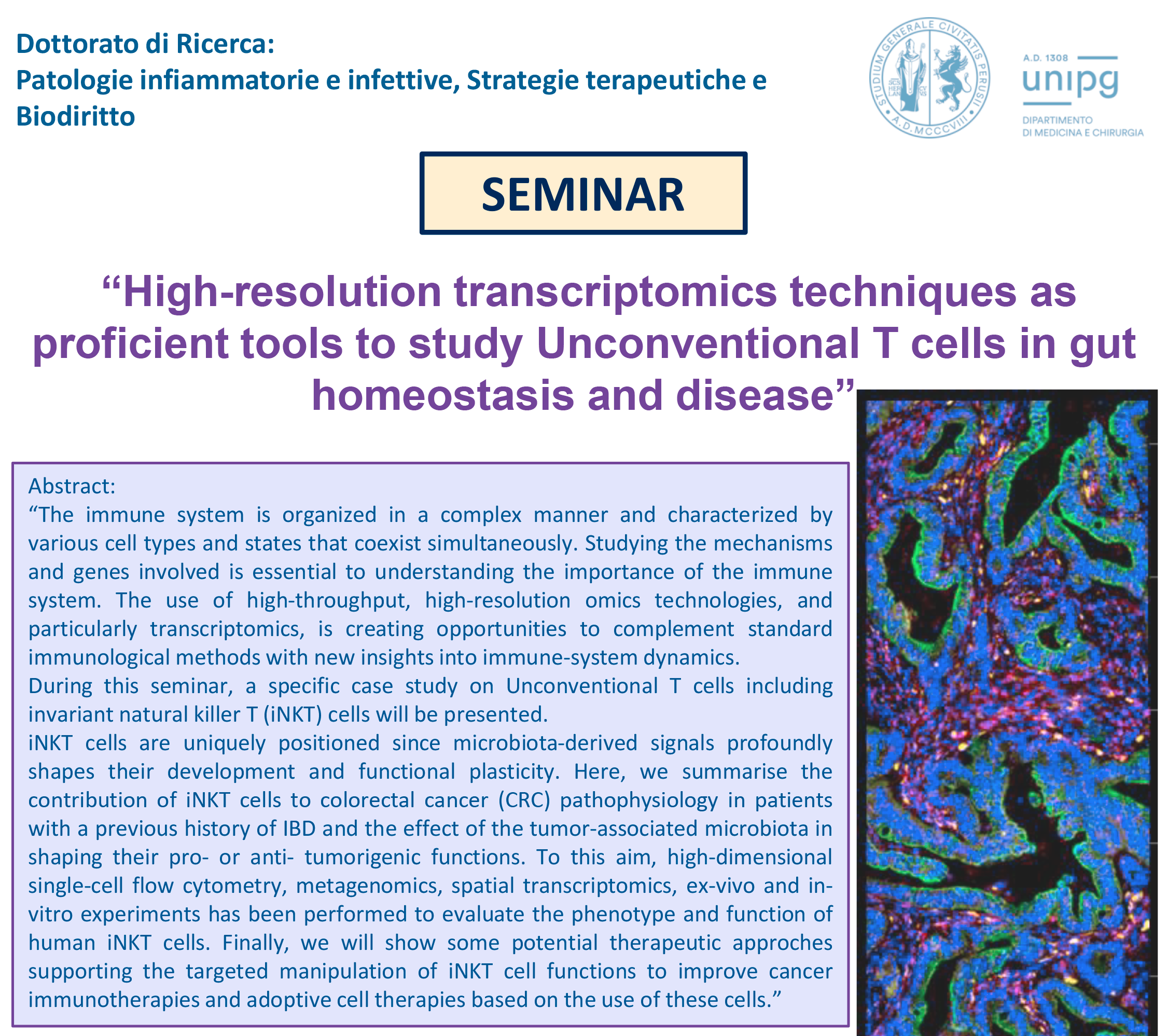 Post Doc fellow at Mucosal Immunology lab, University of Milano-Bicocca, Italy
Post Doc fellow at Mucosal Immunology lab, University of Milano-Bicocca, Italy
26 Giugno alle ore 10,00 - Aula: 4, edificio B, piano -1
Polo Unico di Medicina
21-06-2024Intervista
Intervista doppia
Prof.ssa Ciriana ORABONA \ Prof. Stefano BRUSCOLI
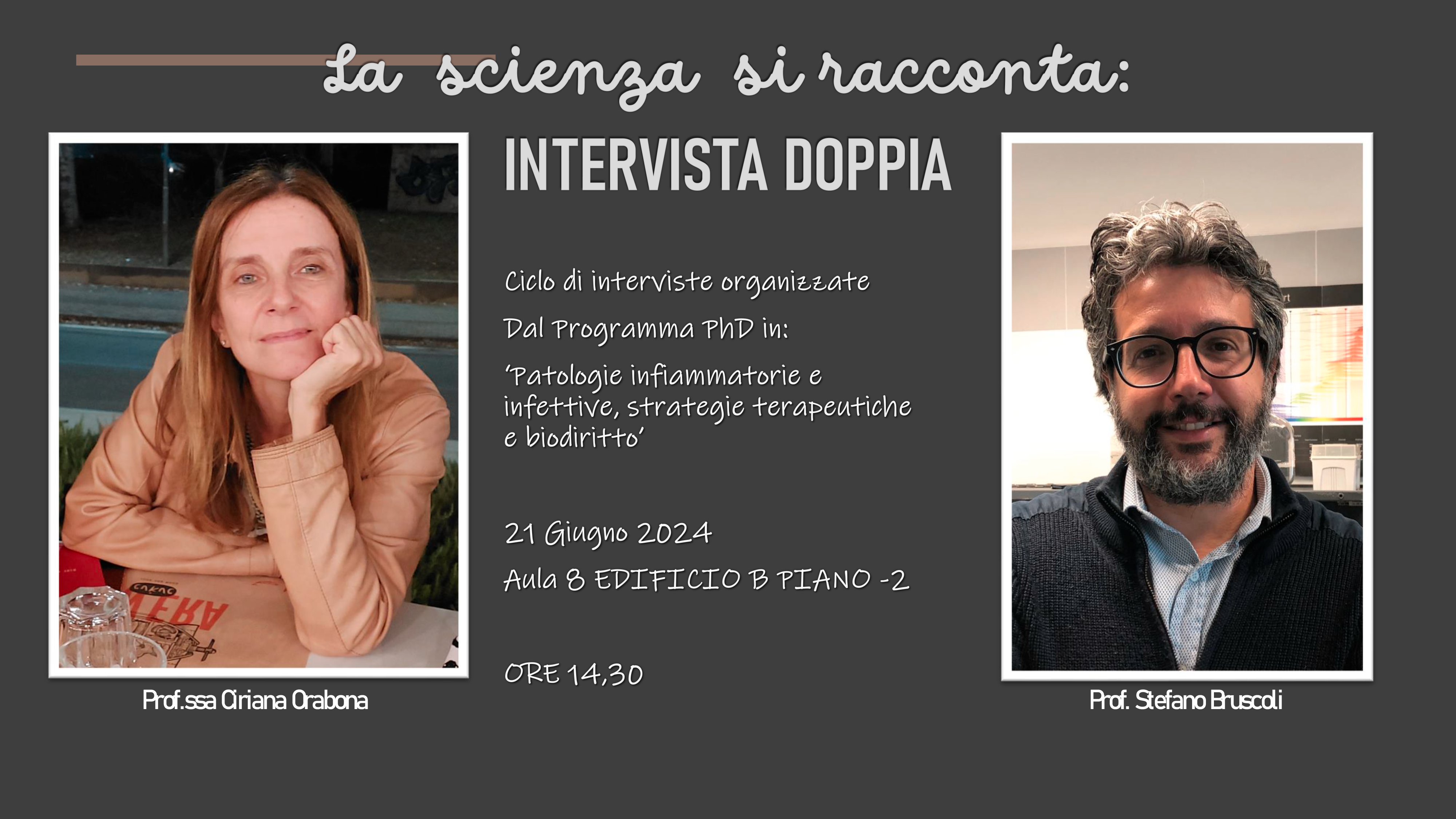 Ciclo di interviste organizzate Dal Programma PhD in:
Ciclo di interviste organizzate Dal Programma PhD in:
‘Patologie infiammatorie e infettive, strategie terapeutiche e biodiritto’
21 Giugno 2024
Aula 8 EDIFICIO B PIANO -2
ORE 14,30
19-06-2024Seminario
Connections in the AHR: a ticket to multiple destinations in infection, immunity, and therapy
Dott. Pedro Alves
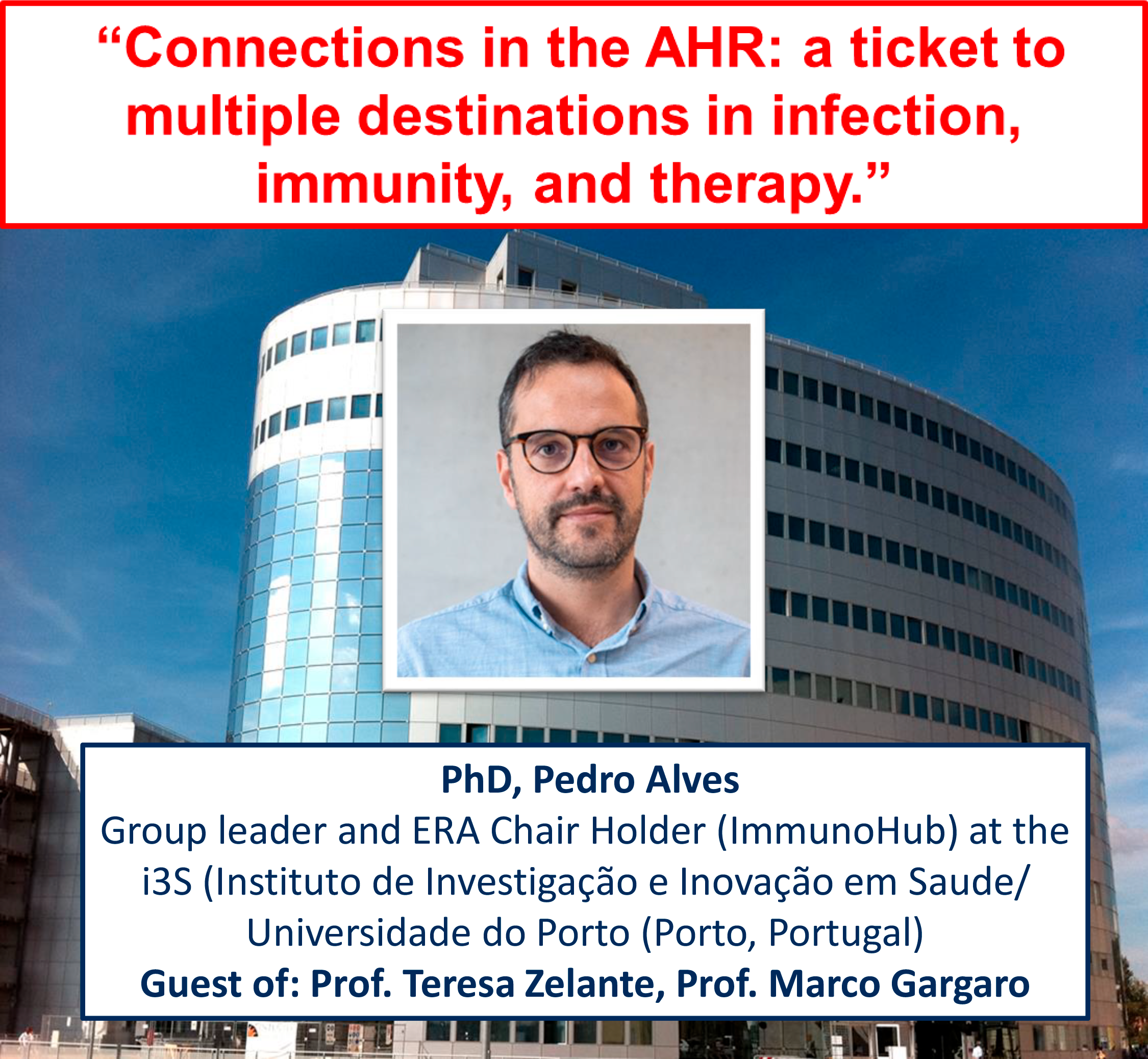 Dipartimento di Medicina e Chirurgia
Dipartimento di Medicina e Chirurgia
Università degli Studi di Perugia
19 Giugno alle ore 11,00 - Aula: 4, edificio B, piano -1
14-06-2024Seminario
PhD Journal organized by the PhD Programme in: Inflammatory and infectious pathologies , therapeutic strategies and biolaw
Advanced Glycation End-Product Precursor Methylglyoxal May Lead to Development of Alzheimer’s Disease
Dott.ssa Dominga Manfredelli
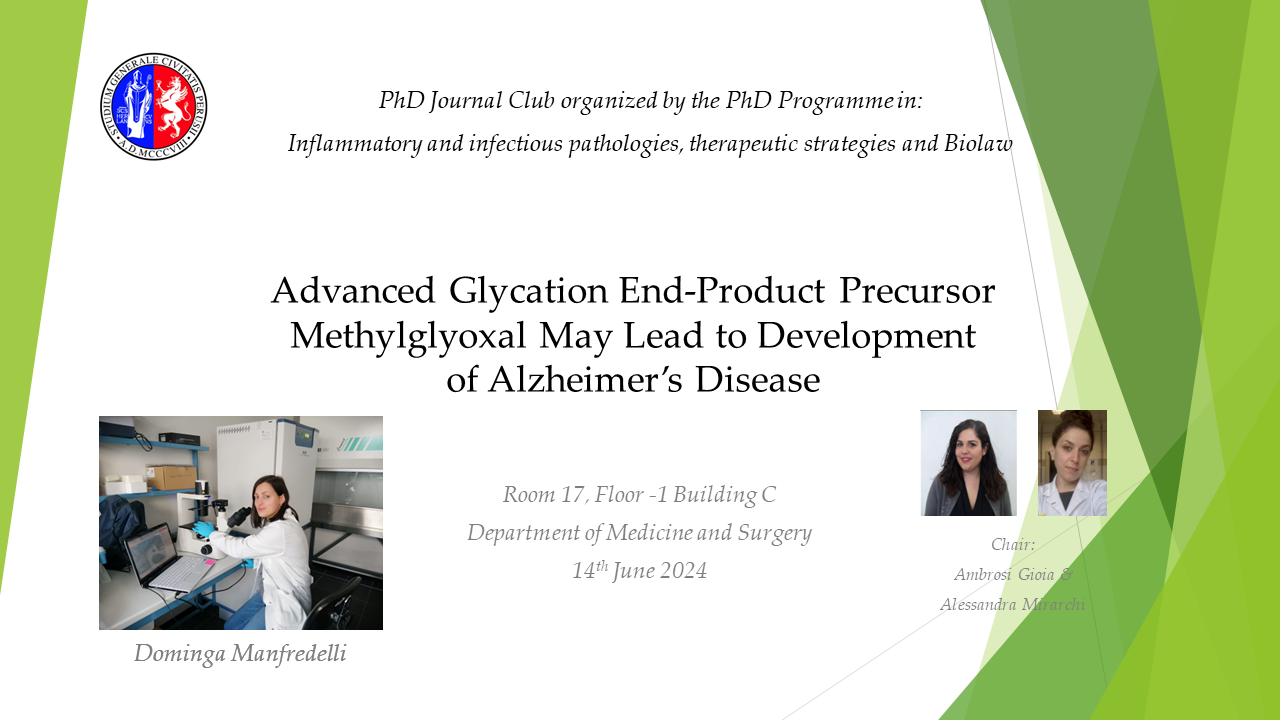 Dipartimento di Medicina e Chirurgia
Dipartimento di Medicina e Chirurgia
Università degli Studi di Perugia
14 Giugno alle ore 15,30 - Aula: 17, edificio C, piano -1
06-06-2024Seminario
Utilizzo delle risorse elettroniche per la ricerca bibliografica
Dott.ssa Susanna Mattioli
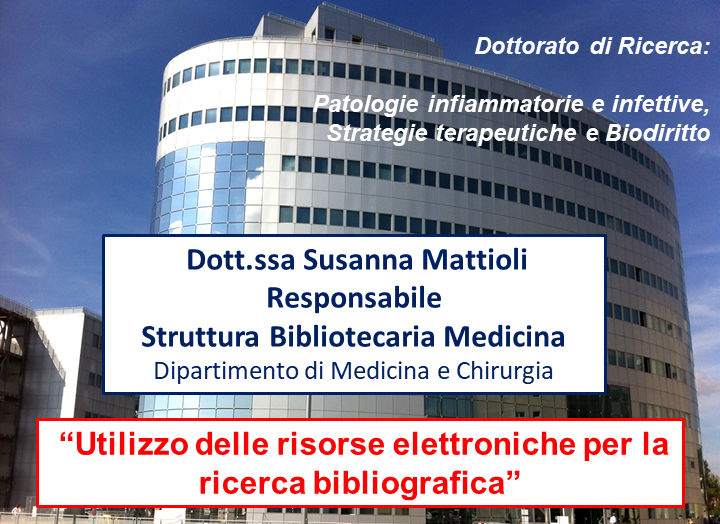 Ciclo di interviste organizzate Dal Programma PhD in:
Ciclo di interviste organizzate Dal Programma PhD in:
‘Patologie infiammatorie e infettive, strategie terapeutiche e biodiritto’
6 Giugno 2024 dalle 9.30 alle ore 12.30
c/o la Biblioteca Biomedica
Polo Unico di Medicina, Edificio A (Ellisse), PIANO -1
17-05-2024Seminario
PhD Journal organized by the PhD Programme in: Inflammatory and infectious pathologies , therapeutic strategies and biolaw
Effect of Alirocumab Added to High-Intensity Statin Therapy on Coronary Atherosclerosis in Patients With Acute Myocardial Infarction
Dott. ssa Gioia AMBROSI
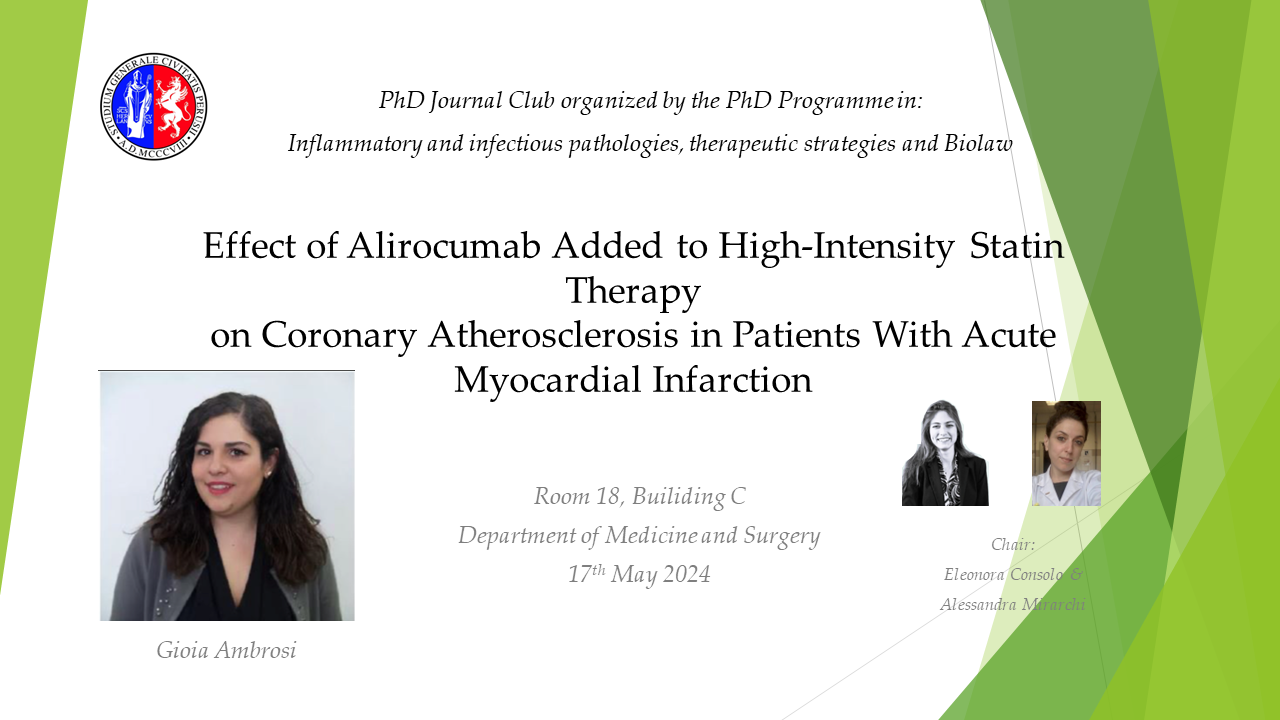 Dipartimento di Medicina e Chirurgia -
Dipartimento di Medicina e Chirurgia -
Università degli Studi di Perugia
17 MAGGIO alle ore 15,30 - Aula: 18, edificio C, piano 0
link aula virtuale
03-05-2024Seminario
PhD Journal organized by the PhD Programme in: Inflammatory and infectious pathologies , therapeutic strategies and biolaw
Neuron-to-microglia Crosstalk in Psychiatric Disorders
Dott. ssa Alessandra MIRARCHI
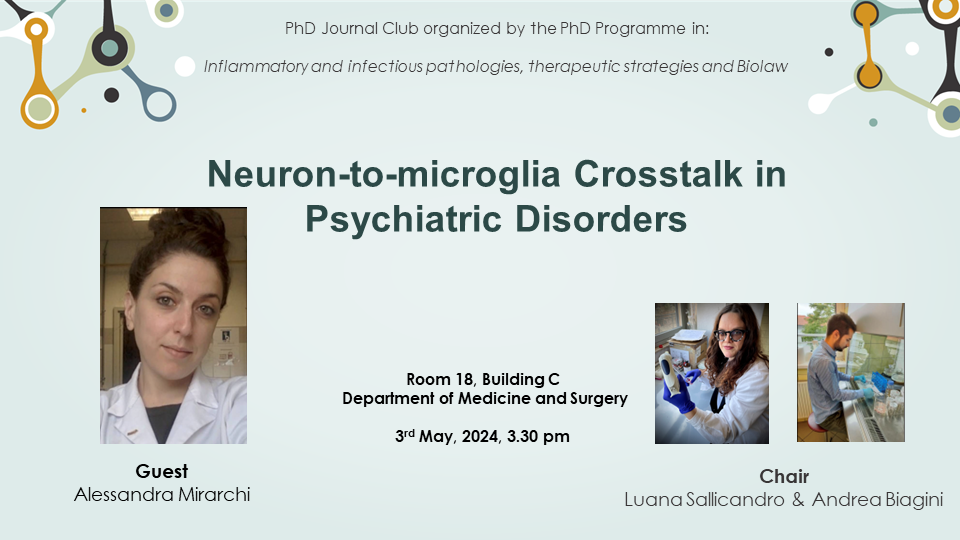 Dipartimento di Medicina e Chirurgia -
Dipartimento di Medicina e Chirurgia -
Università degli Studi di Perugia
3 MAGGIO alle ore 15,30 - Aula: 18, edificio C, piano 0
Si comunica che il seminario è stato spostato in aula Tesi
29-04-2024Seminario
Bando Erasmus+ Traineeship Azione chiave 1 (KA1) per Dottorandi: opportunità e mobilità
Prof.ssa Simona Ronchetti
PA in Farmacologia
Delegato Erasmus
Dipartimento di Medicina e Chirurgia
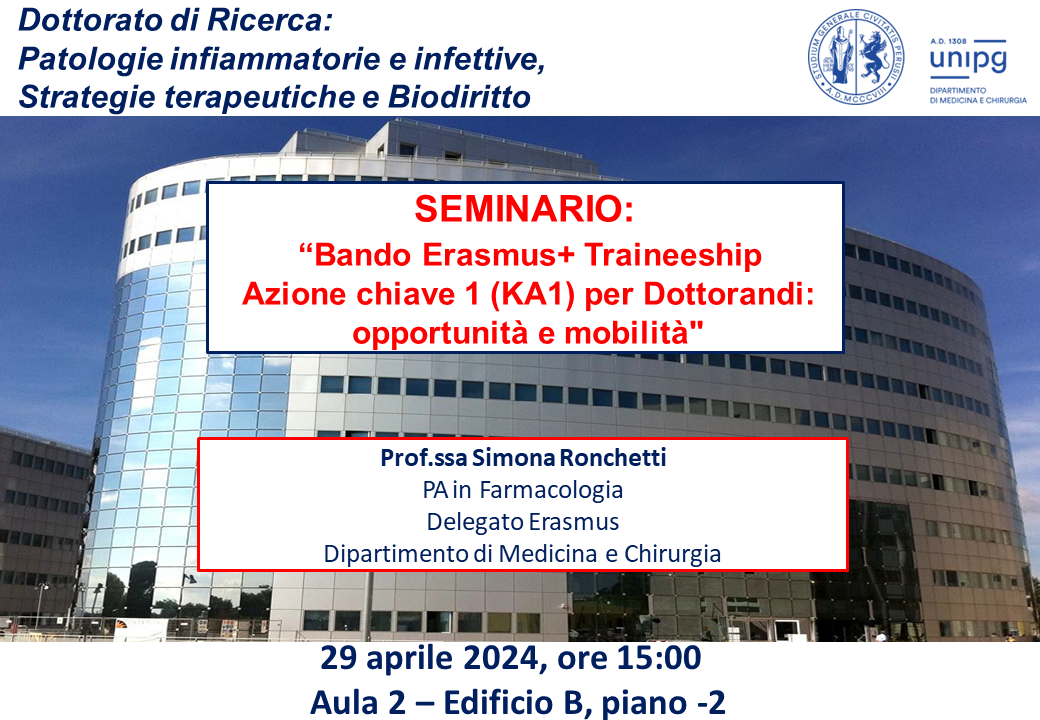 Dipartimento di Medicina e Chirurgia -
Dipartimento di Medicina e Chirurgia -
Università degli Studi di Perugia
29 Aprile alle ore 15:30 - Aula 2 Edificio B, piano -2
19-04-2024Seminario
Systems Biology in Immune and Infectious Pathologies (XXXVI cycle)
Final Defence of PhD Students
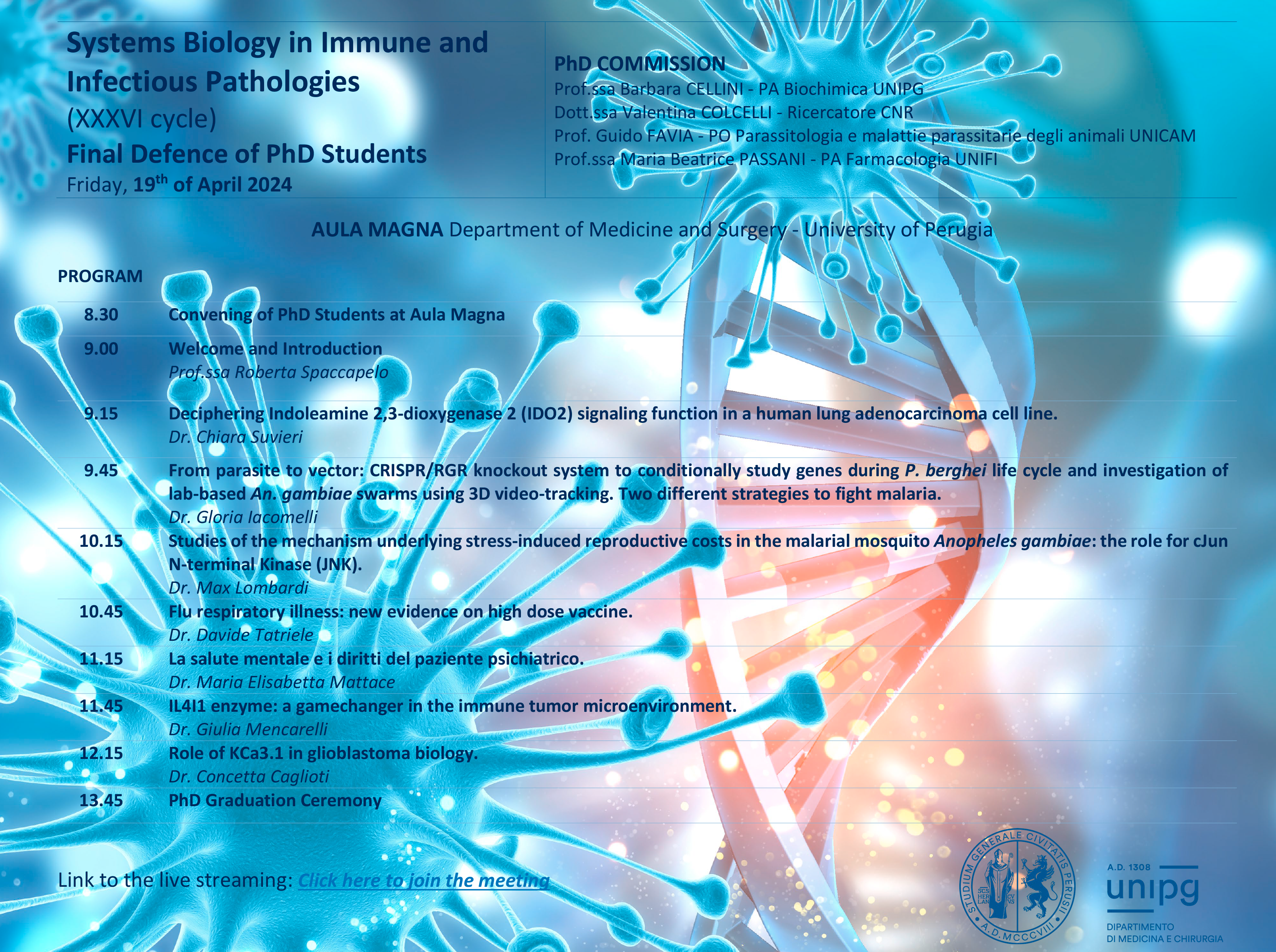 Dipartimento di Medicina e Chirurgia -
Dipartimento di Medicina e Chirurgia -
Università degli Studi di Perugia
19 Aprile alle ore 8,30 - Aula: MAGNA
05-04-2024Seminario
PhD Journal organized by the PhD Programme in: Inflammatory and infectious pathologies , therapeutic strategies and biolaw
Effects of routine early treatment with PCSK9 inhibitors in patients undergoing primary percutaneous coronary intervention for ST-segment elevation myocardial infarction: a randomised, double-blind, shamcontrolled trial”
Dott. ssa Eleonora CONSOLO
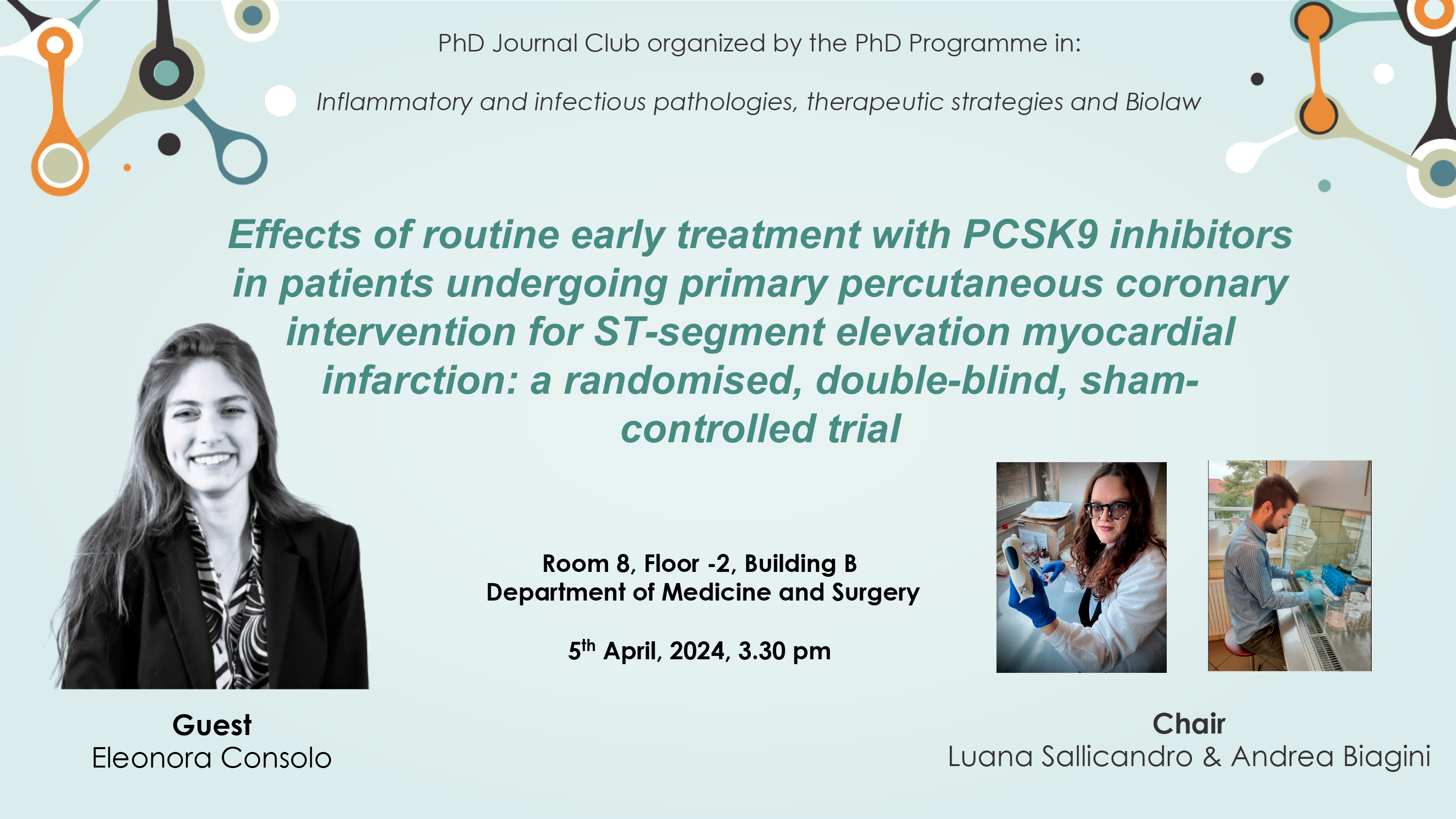 Dipartimento di Medicina e Chirurgia -
Dipartimento di Medicina e Chirurgia -
Università degli Studi di Perugia
5 Aprile alle ore 15,30 - Aula: 8, edificio C, piano 0
08-03-2024Seminario
PhD Journal organized by the PhD Programme in: Inflammatory and infectious pathologies , therapeutic strategies and biolaw
A monocyte–leptin–angiogenesis pathway critical for repair post-infection”
Dott. Andrea BIAGINI
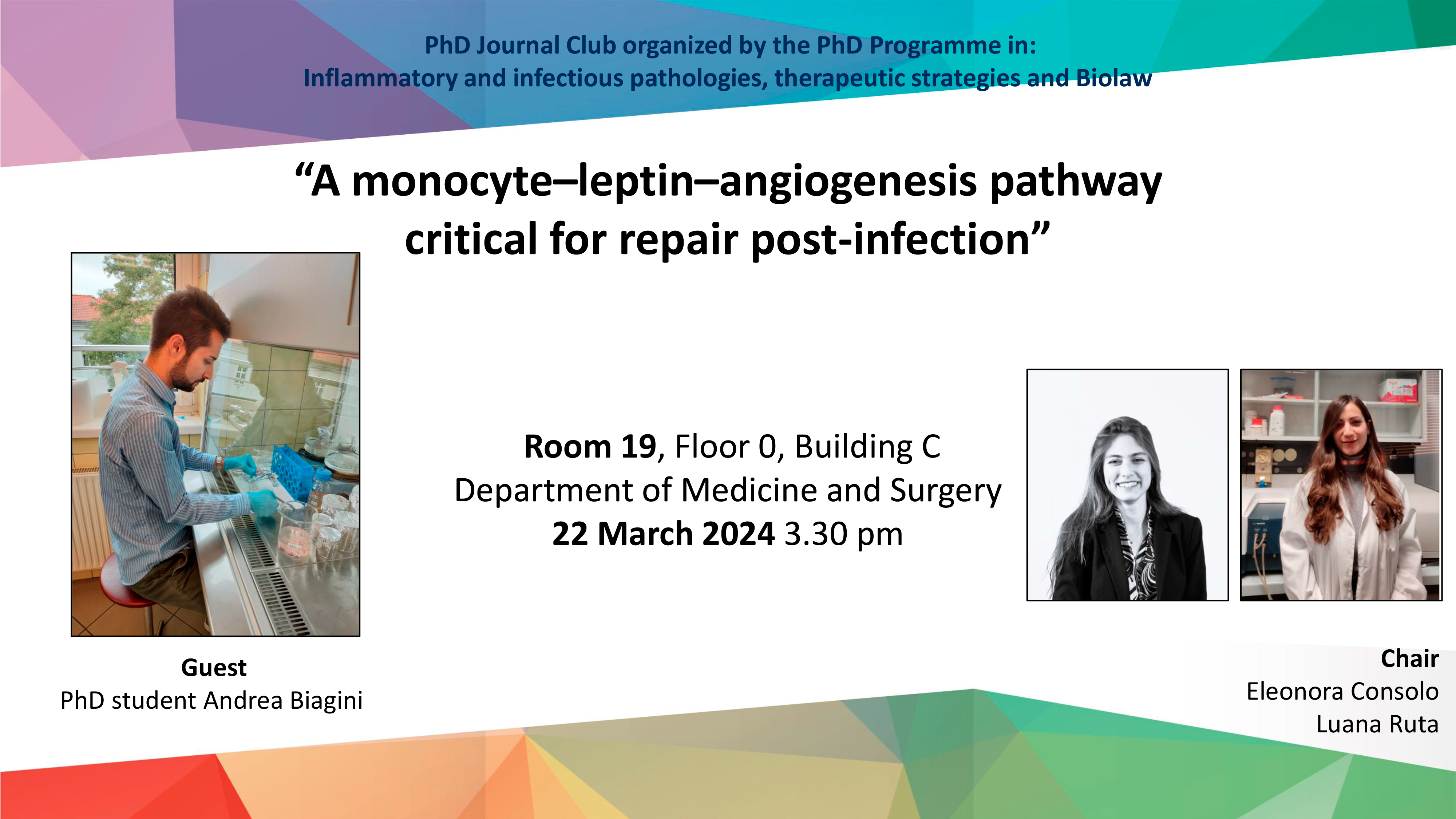 Dipartimento di Medicina e Chirurgia -
Dipartimento di Medicina e Chirurgia -
Università degli Studi di Perugia
22 Marzo alle ore 15,30 - Aula: 19, edificio C, piano 0
16-02-2024Seminario
Molecular networks in health and disease: a bottom-up investigation of the phototransduction cascade.
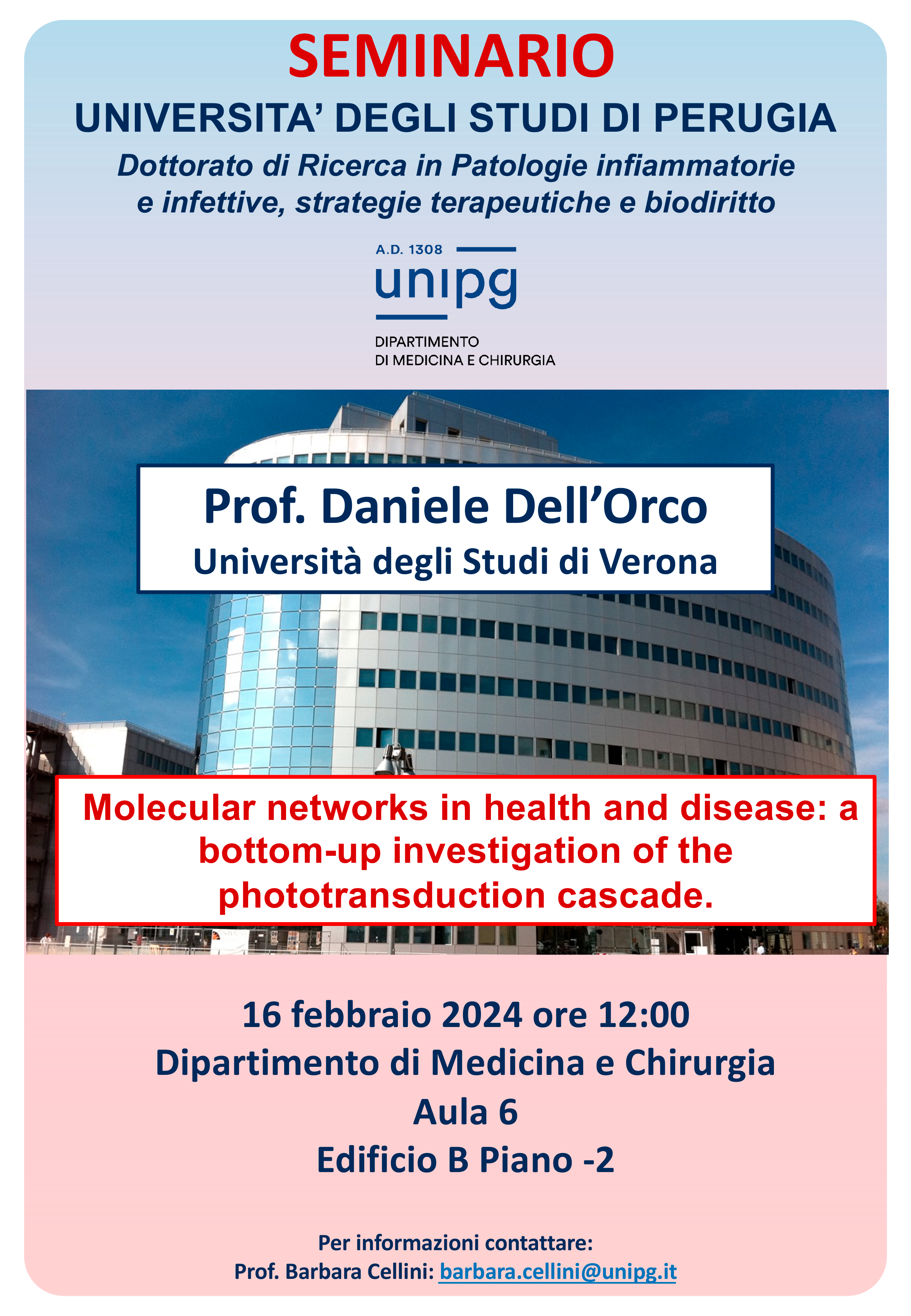 Prof. Daniele dell'Orco (Università degli Studi di Verona)
Prof. Daniele dell'Orco (Università degli Studi di Verona)
Il seminario si terrà venerdì 16 febbraio alle ore 12.00 presso l'Aula 6, Edificio B, Piano -2 del Dipartimento di Medicina e Chirurgia.
09-02-2024Seminario
PhD Journal organized by the PhD Programme in: Inflammatory and infectious pathologies , therapeutic strategies and biolaw
Dual-pharmacophore artezomibs hijack the Plasmodium ubiquitin-proteasome system to kill malaria parasites while overcoming drug resistance
Dr.ssa. Fiorenza Malena
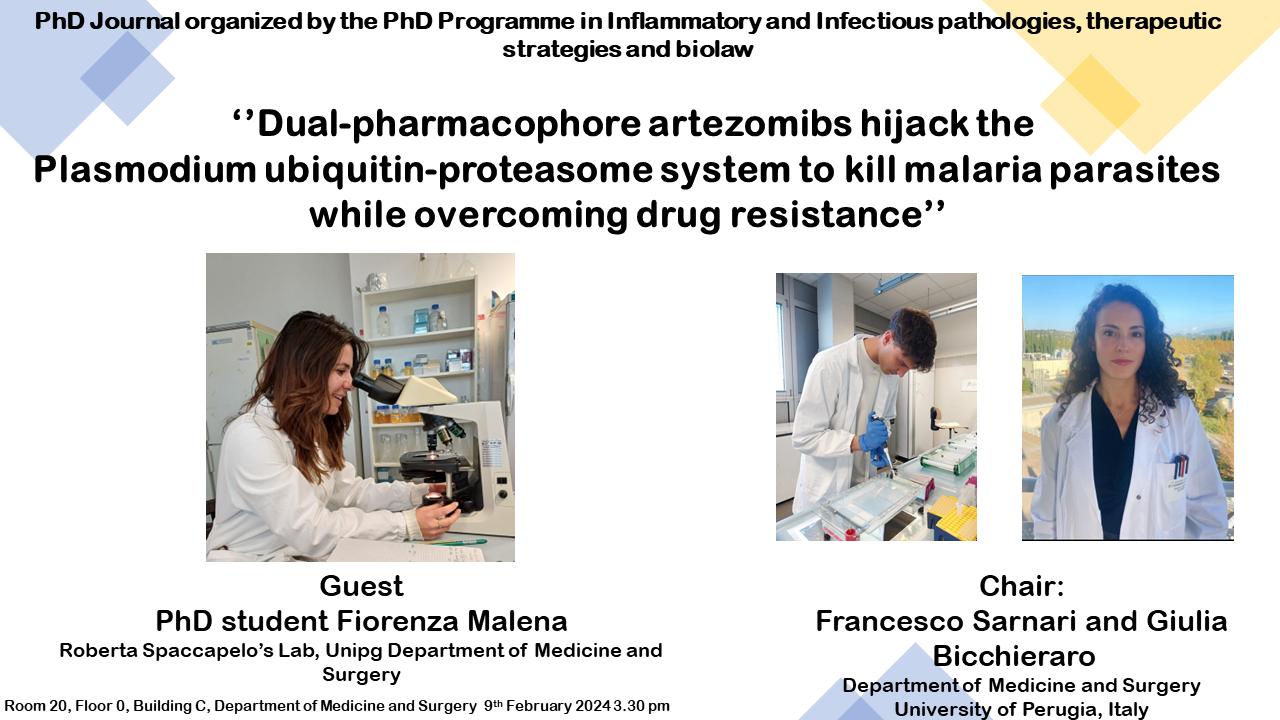 Dipartimento di Medicina e Chirurgia -
Dipartimento di Medicina e Chirurgia -
Università degli Studi di Perugia
9 Febbraio alle ore 15,30 - Aula: 20, edificio C, piano 0
26-01-2024Seminario
PhD Journal organized by the PhD Programme in: Inflammatory and infectious pathologies , therapeutic strategies and biolaw
Inflammation conditional genome editing mediated by the CRISPR-Cas9 system" pubblicato nella rivista iScience-Cell Press
Dott. Francesco Sarnari
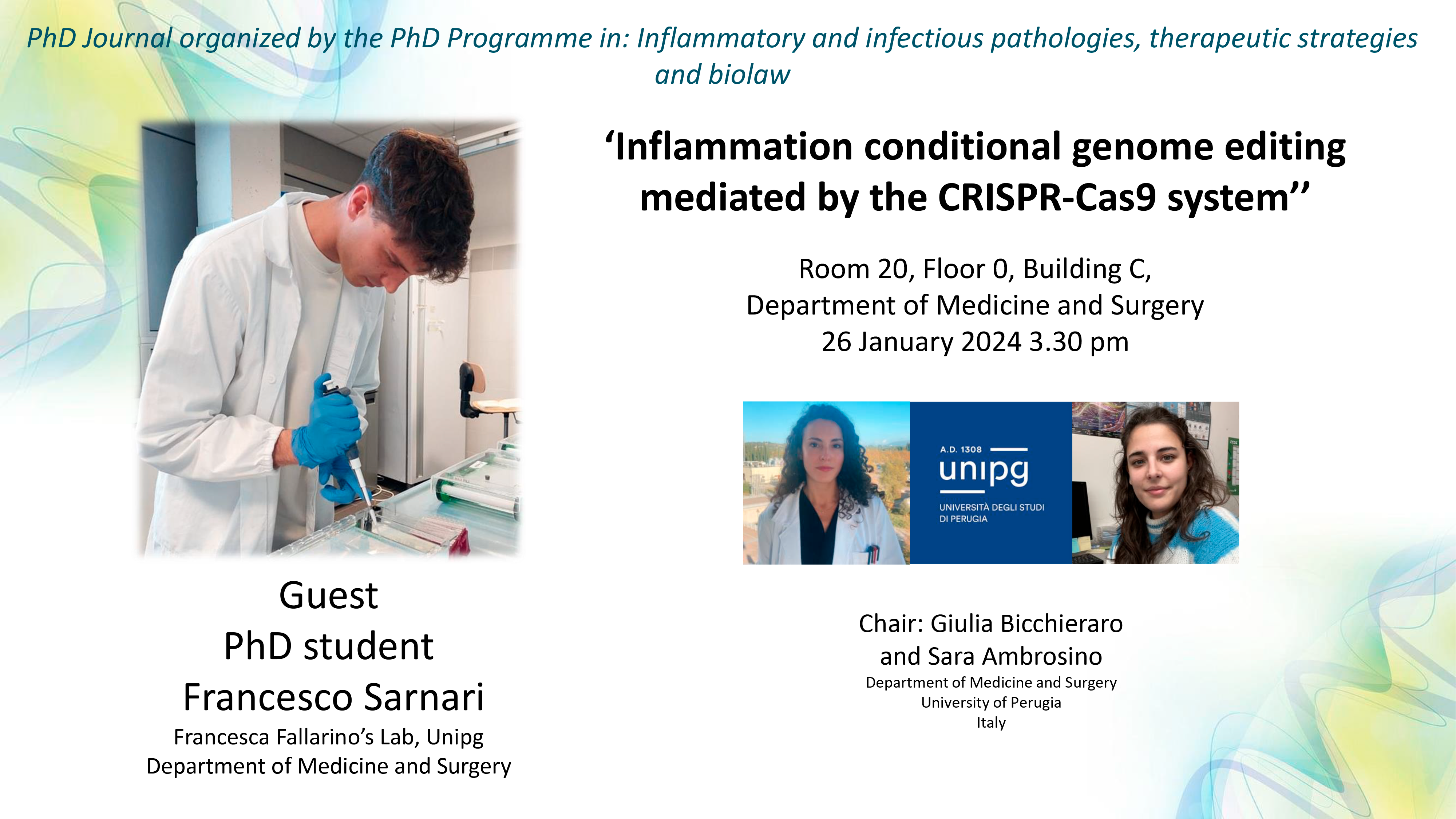 Dipartimento di Medicina e Chirurgia -
Dipartimento di Medicina e Chirurgia -
Università degli Studi di Perugia
26 Gennaio alle ore 15,30 - Aula: 20, edificio C, piano 0
19-01-2024Seminario
PhD Journal organized by the PhD Programme in: Inflammatory and infectious pathologies , therapeutic strategies and biolaw
Mycoplasma pneumoniae carriage in children with recurrent respiratory tract infections is associated with a less diverse and altered microbiota
Dott. ssa Giulia BICCHIERARO
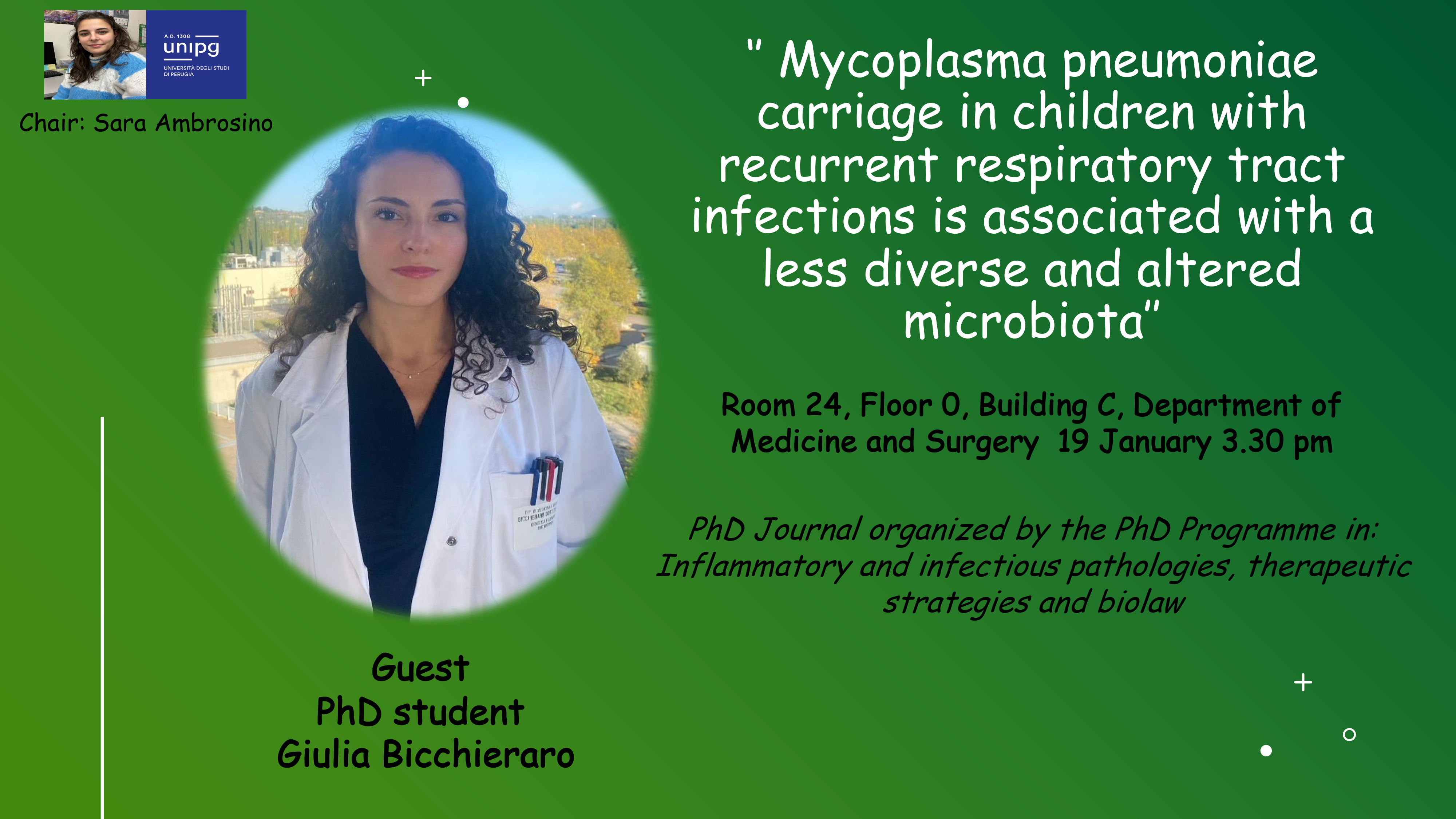 Dipartimento di Medicina e Chirurgia - Università degli Studi di Perugia
Dipartimento di Medicina e Chirurgia - Università degli Studi di Perugia
19 Gennaio alle ore 15,30 - Aula: 24, edificio C, piano 0
20-12-2023Seminario
Cycle of interviews organized by the PhD Programme in: Inflammatory and infectious pathologies , therapeutic strategies and biolaw
La Scienza si racconta
Prof.ssa Francesca FALLARINO e Prof. Giuseppe SERVILLO
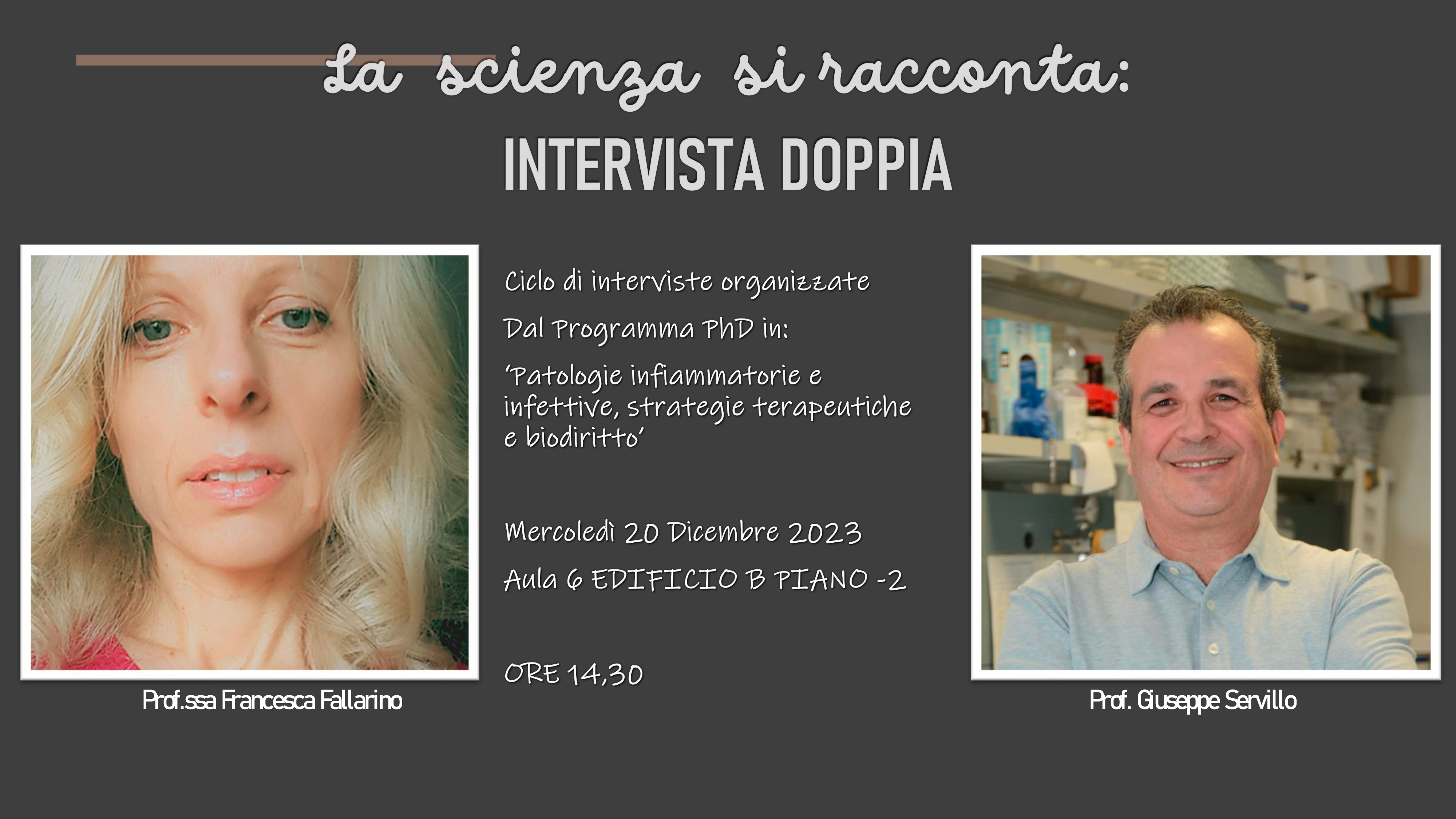 Dipartimento di Medicina e Chirurgia -
Dipartimento di Medicina e Chirurgia -
Università degli Studi di Perugia
20 Dicembre alle ore 14,30 - Aula: 6, edificio B, piano -2
23-11-2023Corso di formazione
DATA ANALYSIS AND BIOSTATISTICS
Prof. Giovanni BELLOMO
Laboratory of Clinical Neurochemistry Neurology Clinic,
University of Perugia -Perugia, (PG), Italy
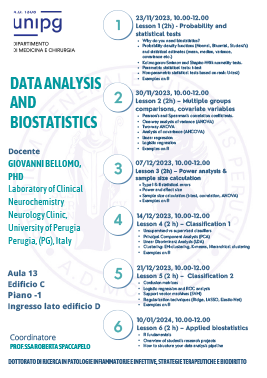 Le lezioni si svolgeranno nei giorni di seguito elencati
Le lezioni si svolgeranno nei giorni di seguito elencati
23 Novembre 2023 alle ore 10.00-12.00 - Aula: 13, Edificio C, piano -1
30 Novembre 2023 alle ore 10.00-12.00 - Aula: 13, Edificio C, piano -1
07 Dicembre 2023 alle ore 10.00-12.00 - Aula: 13, Edificio C, piano -1
14 Dicembre 2023 alle ore 10.00-12.00 - Aula: 13, Edificio C, piano -1
21 Dicembre 2023 alle ore 10.00-12.00 - Aula: 13, Edificio C, piano -1
10 Gennaio 2024 alle ore 10.00-12.00 - Aula: 13, Edificio C, piano -1
Dipartimento di Medicina e Chirurgia - Università degli Studi di Perugia
13-10-2023Seminario
PhD Journal organized by the PhD Programme in: Inflammatory and infectious pathologies , therapeutic strategies and biolaw
Engineering RNA export for measurement and manipulation of living cells
Dott.ssa Doriana RICCIUTI
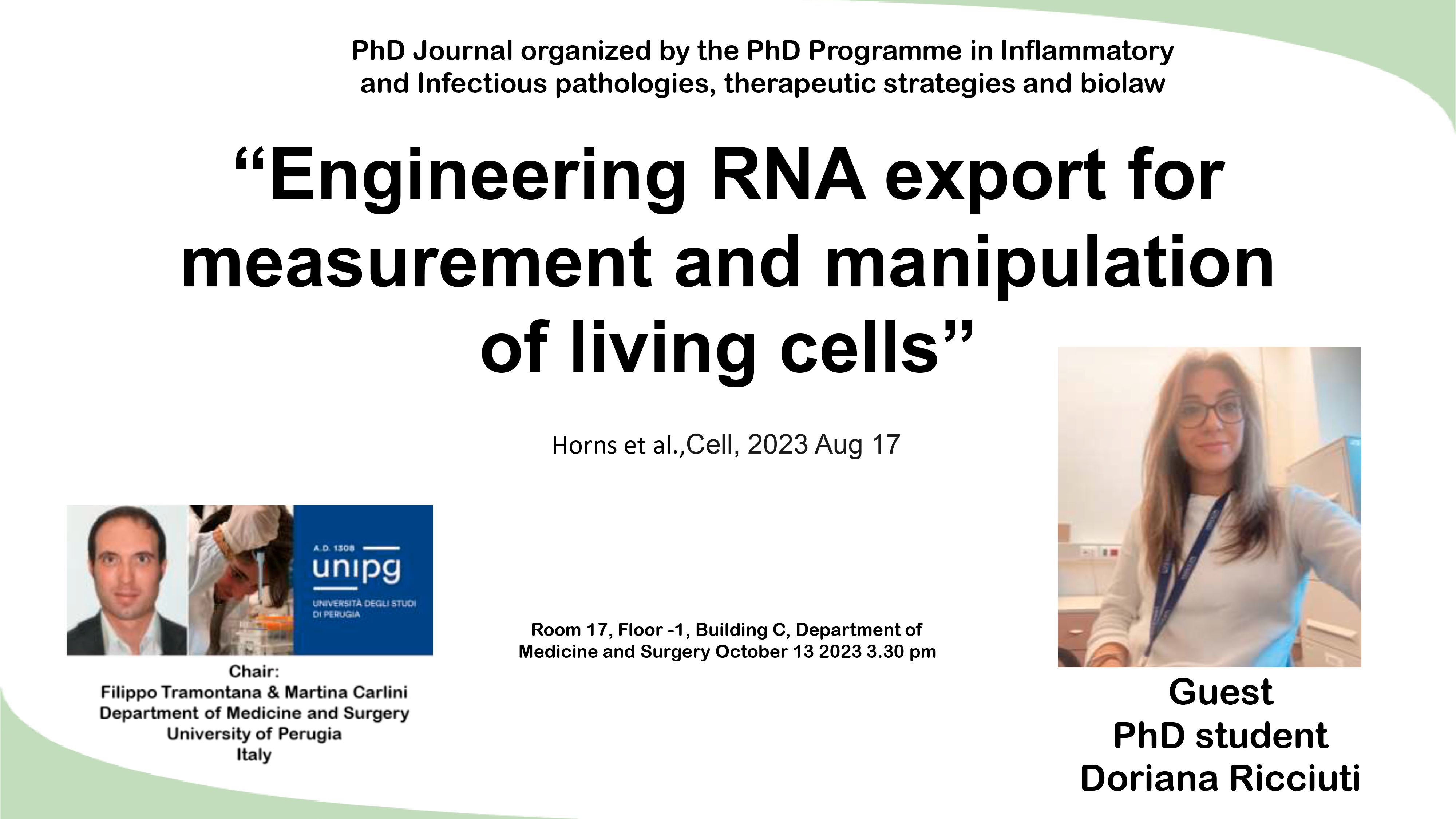 Dipartimento di Medicina e Chirurgia -
Dipartimento di Medicina e Chirurgia -
Università degli Studi di Perugia
13 Ottobre alle ore 15,30 - Aula: 17, edificio C, piano -1
ANNO ACCADEMICO 2022-2023
29-06-2023Seminario
Cycle of interviews organized by the PhD Programme in: Inflammatory and infectious pathologies , therapeutic strategies and biolaw
La Scienza si racconta
Prof. ssa Cinzia ANTOGNELLI e Prof. Guglielmo SORCI
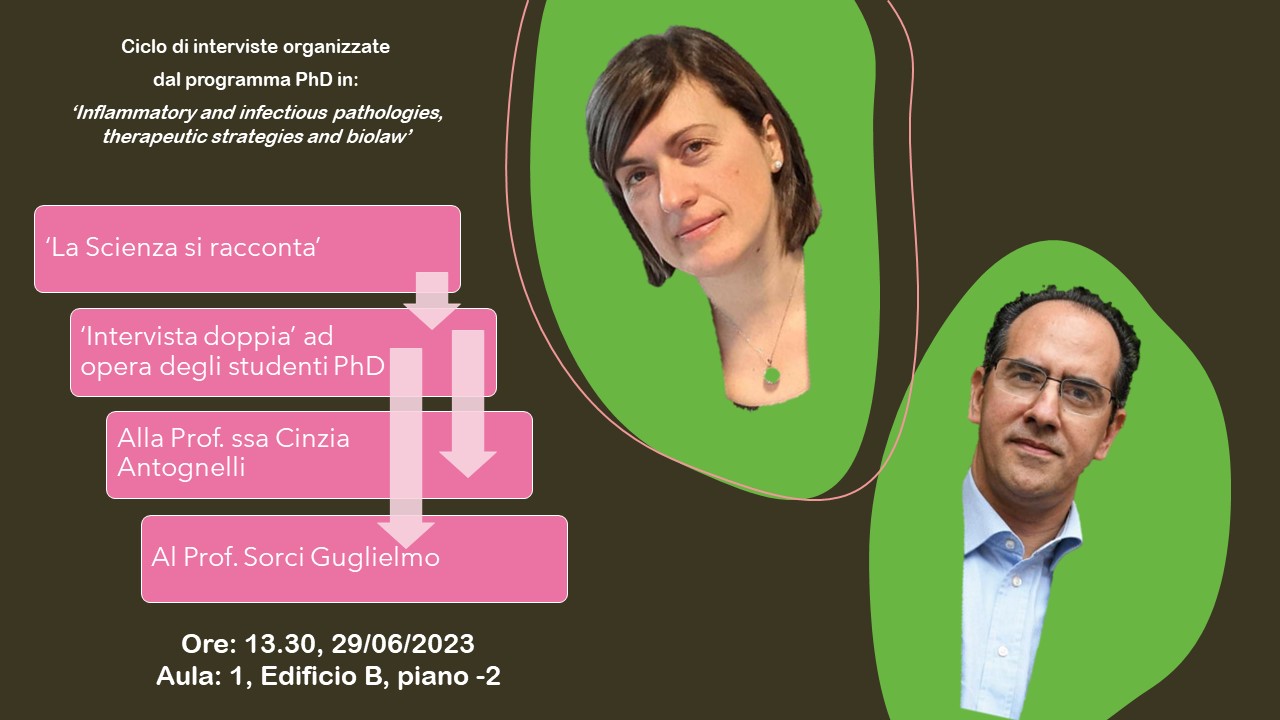 Dipartimento di Medicina e Chirurgia - Università degli Studi di Perugia
Dipartimento di Medicina e Chirurgia - Università degli Studi di Perugia
29 Giugno 2023 alle ore 13,30 - Aula: 1, Edificio B, piano -2
09-06-2023Seminario
PhD Journal organized by the PhD Programme in: Inflammatory and infectious pathologies , therapeutic strategies and biolaw
Personalized RNA neoantigen vaccines stimulate T cells in pancreatic cancer
Guest
PhD student
Suvieri Chiara
Roberta Spaccapelo’s Lab, Unipg Department of Medicine and Surgery
9 Giugno 2023 alle ore 15,30 Aula 7 Edificio B, Dipartimento di Medicina e Chirurgia
08-06-2023Seminario
Neoadjuvant immunotherapy in melanoma The template for personalized immuntherapy in the future
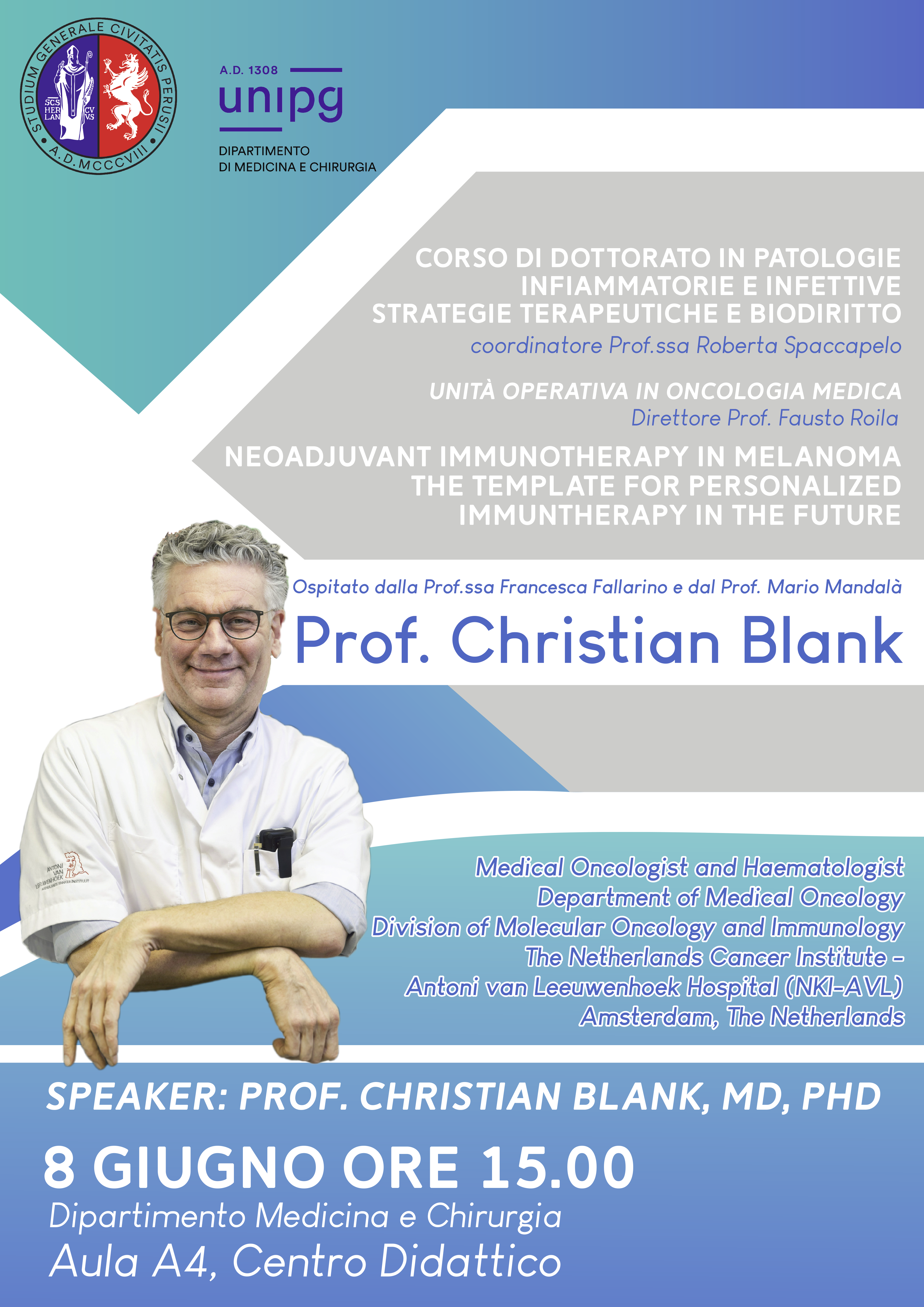 Prof. Christian Blank Medical Oncologist and Haematologist
Prof. Christian Blank Medical Oncologist and Haematologist
Department of Medical Oncology
Division of Molecular Oncology and Immunology
The Netherlands Cancer Institute - Antoni van Leeuwenhoek Hospital (NKI-AVL)
Amsterdam, The Netherlands
8 Giugno 2023 alle ore 15,00
05-05-2023Seminario
PhD Journal organized by the PhD Programme in: Inflammatory and infectious pathologies , therapeutic strategies and biolaw
Introduction to Machine Learning by Dr. Palazzetti
Machine-learning-guided directed evolution for protein engineering
Guest
PhD student
Cagliotti Concetta
Roberta Spaccapelo’s Lab, Unipg Department of Medicine and Surgery
26 Maggio 2023 alle ore 15,30 Aula 7 Edificio B, Dipartimento di Medicina e Chirurgia
05-05-2023Seminario
PhD Journal organized by the PhD Programme in: Inflammatory and infectious pathologies , therapeutic strategies and biolaw
Anopheline mosquitoes are protected against parasite infection by tryptophan catabolism in gut microbiota” pubblicato nella rivista Nature microbiology
Guest
PhD student
Lombardi Max
Roberta Spaccapelo’s Lab, Unipg Department of Medicine and Surgery
05 Maggio 2023 alle ore 16,00 Aula 7 Edificio B, Dipartimento di Medicina e Chirurgia
14-04-2023Seminario
PhD Journal organized by the PhD Programme in: Inflammatory and infectious pathologies , therapeutic strategies and biolaw
Efficacy of High-Dose versus Standard-Dose Influenza Vaccine in Older Adults” pubblicato nella rivista Nature microbiology
Guest
PhD student
Tatriele Davide
Roberta Spaccapelo’s Lab, Unipg Department of Medicine and Surgery
14 Aprile 2023 alle ore 15,30 Aula 24 Edificio C, Dipartimento di Medicina e Chirurgia
31-03-2023Seminario
PhD Journal organized by the PhD Programme in: Inflammatory and infectious pathologies , therapeutic strategies and biolaw
Male swarming aggregation pheromones increase female attraction and mating success among multiple African malaria vector mosquito species
Guest
PhD student
Iacomelli Gloria
Roberta Spaccapelo’s Lab, Unipg Department of Medicine and Surgery
31 Marzo 2023 alle ore 15,30 Aula 24 Edificio C, Dipartimento di Medicina e Chirurgia
24-03-2023Seminario
Come il microbioma sta cambiando la medicina: Tra l'umano, l'ambiente e il computazionale
Prof.ssa Roberta Raffaetà (Dipartimento di Filosofia e Beni Culturali, Università Ca' Foscari Venezia, e Vice-Direttrice di NICHE - Center for Environmental Humanities) e dalla Dott.ssa Valeria Burgio (Ricercatrice postdoc nel progetto "Visualizing the Microbiome", ERC HealthXCross, Università Ca' Foscari Venezia, Dipartimento di Filosofia e Beni Culturali)
24 Marzo 2023 alle ore 12,00
22-03-2023Seminario
MALARIA, IN ITALIANO I ricercatori italiani nel mondo raccontano gli studi per eliminare la malaria
Dott. Giacomo Paganotti
SANTHE Botswana-UPenn Partnership, Gaborone, Botswana
22 Marzo alle ore 15,30
18-03-2023Seminario
Identifying new strategies for improving immunotherapy efficacy by understanding response versus resistance
Prof. Thomas F. Gajewski, MD, PhD (Department of Pathology Medicine and the Ben May Institute, Chicago, Stati Uniti)
18 Marzo 2023 alle ore 11,00
21-11-2022Seminario
MALARIA, IN ITALIANO I ricercatori italiani nel mondo raccontano gli studi per eliminare la malaria
Dott.ssa Valentina Barrera, University of Liverpool, Liverpool, Gran Bretagna
21 Novembre 2022 alle ore 15,30
9-11-2022Seminario
Conoscere, identificare, bloccare gli stadi del parassita malarico Plasmodium falciparum trasmissibili alla zanzara.
Prof. Pietro Alano, Dipartimento di Malattie Infettive, Istituto Superiore di Sanità
9 Novembre 2022 alle ore 14,30
21-10-2022Seminario
MALARIA, IN ITALIANO I ricercatori italiani nel mondo raccontano gli studi per eliminare la malaria.
Prof. Lucio Luzzatto, Muhimbili University of Health and Allied Sciences, Tanzania
presentano: Dott. Pietro Alano, Dipartimento Malattie Infettive ISS e Prof. Guido Favia, Università degli Studi di Camerino
Mostra Locandina Aula virtuale
14-10-2022Seminario
Simbiosi microbiche in insetti vettori: implicazioni nel controllo delle parassitosi.
Prof. Guido Flavia (School of Biosciences & Veterinary Medicine, University of Camerino)
13-10-2022 Seminari
CICLO DI SEMINARI DI PARASSITOLOGIA MOLECOLARE
On line ore 14:30 @
https://meet.google.com/odi-jptx-wwp
ANNO ACCADEMICO 2019-2020
17-05-2020 Webinar
PARASITES in PARADISE: facing down the scourge of Malaria in pregnancy
Prof. Matthew Chico (London School of Hygiene and Tropical Medicine, London, UK) – 17/05/2020
19-02-2020Seminario
UniVAX DAY 2020 chi si vaccina protegge se stesso.... e gli altri
Giornata di informazione sui vaccini dedicata agli studenti delle scuole medie superiori
09-12-2019Seminario
Seminar Jan Fric, PhD
Human mucosal tissue organoids promote innate immune response indipendent of leukocytes
03-12-2019Seminario
Le questioni etiche nei progetti di ricerca e innovazione
Dott. Bruno Mourenza (National Contact Point Sfida Sociale I, Health, Wellbeing and Demographic Change dell’Agenzia per la Promozione della Ricerca Europea – APRE) Aula Magna della Scuola Interdipartimentale di Medicina Polo didattico S. Andrea delle Fratte – Perugia, 03/12/2019
25-11-2019Seminario
Multiplicity of Roles for a Xenobiotic Pregnane X Receptors (PXR)
Prof. Sridhar Mani (Albert Einstein College of Medicine, New York, USA) – Perugia, 25/11/2019
ANNO ACCADEMICO 2018-2019
21-06-2019Seminario
Unconventional proteins trafficking in plant cells…a still unexplored road
Dott. Andrea Pompa (Dipartimento di Scienze Biomolecolari - Università degli Studi di Urbino Carlo Bo) – Perugia, 21/06/2019
14-06-2019Seminario
A new role of Th17 cells in tolerance induction?
Prof. Carsten B. Schmidt-Weber (Director of the Institute of Allergy Research of Helmholtz Center, Munich, Germany) – Perugia, 14/06/2019
07-06-2019Seminario
Development of novel therapies for inborn errors of metabolism
Prof. Nicola Brunetti Pierri (TIGEM - Telethon Institute of Genetics and Medicine - Department of Translational Medicine, University of Naples "Federico II") – Perugia, 07/06/2019
01-02-2019Seminario
UNIVAX DAY 2019 - Giornata di informazione sui vaccini 2019
Aula Magna della Scuola Interdipartimentale di Medicina Polo didattico S. Andrea delle Fratte – Perugia, 01/02/2019
15-01-2019Seminario
Lymph: Formation, Composition & Immunological Role
Prof. Laura Santambrogio (Albert Einstein College of Medicine – New York) – Perugia, 15/01/2019
17-12-2018Seminario
In vivo gene therapy with AAV vectors, lessons learned from the immune system
Prof. Federico Mingozzi (University Pierre and Marie Curie–Paris, INSERM and Genthon, Paris, France)– Perugia, 17/12/2018
ANNO ACCADEMICO 2017-2018
14-09-2018Seminario
Genetic control of Aspergillus persistence in fungal allergy
Dr. Sara Gago (The University of Manchester, Manchester Fungal Infection Group, Faculty of Biology, Medicine and health) – Perugia, 14/09/2018
09-07-2018Seminario
Statistical physics approach to the collective behavior of natural swarms
Prof. Andrea Cavagna (Institute for Complex Systems of the National Research Council - CNR-ISC, Rome) – Perugia, 09/07/2018
09-07-2018Seminario
Efferent modulation of auditory sensitivity in mosquitoes: from auditory transduction to swarming behavior
Dr. Marta Andrès (Marie Curie Fellow, Ear Institute London, University College London, UCL, UK) – Perugia, 09/07/2018
05-06-2018Seminario
Accelerated aging of immune cells in childhood and adolescent cancer survivors
Dr. Jan Fric (International Clinical Research Center, St. Anne’s University Hospital, Brno, Czech Republic) – Perugia, 05/06/2018
05-06-2018Seminario
Metabolic Profiling of Circulating Gut Microbial Metabolites and Host Inflammatory Status
Dr. Zdenek Spacil (Masaryk University, Brno, Czech Republic) – Perugia, 05/06/2018
22-03-2018Seminario
In vivo imaging of immune responses to pathogensand tumors
Prof. Matteo Iannacone (Istituto Scientifico Universitario San Raffaele - Milano) – Perugia, 22/03/2018
09-01-2018Seminario
La nuova neuranatomia funzionale delle connessioni cerebrali
Prof. Marco Catani (NatBrainLab, Department of Forensic and Neurodevelopmental Sciences, Institute of Psychiatry, Psychology and Neuroscience, King's College London, Londra, UK) – Perugia, 09/01/2018
14-11-2017Seminario
Rotavirus, norovirus and helicobacter pylori: what in common and what is new
Prof. Miguel O’Ryan (Institute of Biomedical Sciences, Faculty of Medicine, University of Chile, Santiago del Chile, Chile) – Perugia, 14/11/2017
- Details
Coordinator
This email address is being protected from spambots. You need JavaScript enabled to view it.
Vice - Coordinator
This email address is being protected from spambots. You need JavaScript enabled to view it.
- The Research Doctorate represents a post-graduate advanced training course on research topics of high social impact and wide-ranging concerning pathologies which, epidemiologically, occupy the first places in terms of diffusion and, according to WHO projections, are destined to increase. Infectious and inflammatory diseases represent a serious public health problem and are among the main causes of mortality and morbidity worldwide. In these pathologies there is a failure or chronicity of the immune response, which instead would have the potential ability to successfully cope with their onset or progression. In order to treat or prevent inflammatory or infectious states it is necessary to understand in depth the mechanisms underlying the onset of the pathology, how the immune system controls inflammation, the strategies responsible for evasion from the immune system, the effects on the host following the activation of an immune response directed against itself (autoimmune disease) and the risk factors predisposing to the pathology. The Doctorate intends to attract young researchers with the aim of training and motivating a new generation of scientists by transferring to them knowledge and technical skills that will allow them to study infectious diseases and the activation of the immune response in innovative, exciting and productive ways. The doctoral course provides skills in strategic research areas at an international level, such as: i) the study of basic pathogenetic mechanisms that could lead to the identification of new diagnostic tools, the development of vaccines and other interventions for prevention and control of infectious diseases and the identification of new therapeutic targets; ii) the analysis of immune and metabolic responses in inflammatory and immune diseases as possible targets for new pharmacological therapies and for the development of personalized therapies; iii) the study of rare diseases; iv) the identification of risk factors for the prevention of chronic-degenerative diseases. The Doctorate promotes, also thanks to the countless international collaborations activated by the Doctorate teachers, a multidisciplinary approach that includes the omics sciences (transcriptomics, proteomics, metabolomics, lipidomics, metagenomics, secretomics) in association with the traditional biological sciences (immunology, molecular biology and cellular, microbiology, biochemistry, physiology, genomics, pathology, anatomy, pharmacology and public health), with the aim of evaluating the uses of research products for improving the health of the population. Infectious and immune-mediated diseases currently under study include malaria, toxoplasmosis, fungal (Candida and Aspergillus) and viral (coronavirus and other respiratory viruses) diseases, diabetes, obesity, cancer, autoimmune diseases, muscular dystrophy/atrophy and rare diseases. Further immunological studies focus on the genetic regulation of the immune response, the interaction between the innate immune system and gut microbial communities, and the function and regulation of cytokines involved in inflammation. The doctorate is divided into two different but interconnected curricula: Integrative biology of the host-pathogen relationship: The curriculum focuses on recent advances in the biology of infectious diseases and provides the basis for conducting research on these pathologies with both basic, translational or applicative implications. Integrated biological strategies in genetic, immuno-metabolic and oncological pathologies: The curriculum focuses on the acquisition of specific skills in the interface between immune and metabolic responses in oncological, autoimmune and genetic pathologies with the aim of developing innovative therapies. The approach to the various pathologies is translational and aims at the identification of biomarkers and possible therapeutic targets. The training project planned for the doctoral course has a high level of in-depth analysis and includes the following objectives: 1. Teaching activities and specific PhD seminars to acquire advanced knowledge in the biomedical field; training activities aimed at developing capabilities in the dissemination/communication of scientific results, technological transfer and entrepreneurship; multidisciplinary, transdisciplinary and interdisciplinary training activities; training activities aimed at gaining knowledge of European and international research frameworks. 2. Interaction with the national and international scientific community; 3. Acquisition of high professional level knowledge in the academic and industrial world.
- The main and specific objective of the Doctorate course is to train new generations of highly professional and multidisciplinary researchers in the field of inflammatory, immune and infectious diseases, capable of meeting and successfully tackling the scientific challenges represented by the knowledge of the human genome, inflammatory and infectious diseases, microorganisms and new and increasingly sophisticated technologies. In a transversal sense, the interdisciplinarity of the course and the important national and international collaborations of the Doctorate teachers will allow students to acquire knowledge in the field of innovative and cutting-edge preventive and therapeutic strategies (such as, for example, in the field of biopharmaceuticals and of personalized medicine) capable of counteracting the emerging challenges in the field of infectious diseases and inflammatory pathologies. The Doctorate will contribute to the creation of new links between Italian and foreign universities and the industrial world in a specialized scientific field, yet characterized by rapid evolution and multidisciplinarity. All doctoral students will be able to benefit from the interaction and participation/collaboration with the partner companies. In this context, students will have the opportunity to develop applied research projects and participate in the transfer of scientific results to the industrial world. The Doctorate course is divided into 2 curricula which provide for the development of complementary skills in the field of basic, pre-clinical and clinical research and in academic, national and international, and corporate contexts. The students themselves will become protagonists and collaborators of the Doctoral course, proposing and managing scientific research themselves and in collaboration with the course teachers. The Doctorate aims to broaden and deepen the scientific knowledge of doctoral students also through a structured training course developed in collaboration with teachers with a broad national and international scientific profile. At the end of the Doctorate, students will have acquired familiarity with the most innovative technologies of cellular and molecular biology. Furthermore, they will possess notions of a high professional level in the topics of biology of the host-pathogen relationship, inflammatory-based pathologies, immunogenetics and translational immunology and biostatistics, which will allow them to have a wide range of professional opportunities in the academic and industrial world.
At the end of the training course, doctoral students will have acquired high professional level knowledge regarding disciplines addressed during the Doctoral program and will be able to promote the advancement of scientific and technological knowledge, both in the academic and industrial fields. This will allow PhDs both access to a university career and placement in public and private research bodies, or in specialized companies (for example: pharmaceutical, biotechnological, nutraceutical companies and hospitals). The proposed training path and the international framework of the Doctorate will facilitate this process by providing students with the opportunity to access internationally prestigious post-doctoral scholarships, such as Marie-Curie grants and EMBO grants, or to national and international research programmes for young researchers (SIR, ERC starting grant, AIRC). Furthermore, the interaction and the study/research periods carried out at the partner companies will allow the PhD students to quickly come into contact with the industrial world and will provide a competitive advantage for possible hiring within the same companies. The Doctorate also lays the foundations for the possible creation of start-ups and spin-offs by young researchers. Finally, PhD students are regularly notified with calls for temporary or permanent positions issued by scientific associations, scientific journals, pharmaceutical industries and Italian and foreign universities. The implementation of a monitoring system for professional opportunities is envisaged and will be made available already during the PhD course.
Integrative biology of the host-pathogen relationship: The curriculum introduces students to recent advances in the biology of infectious diseases and provides the basis for conducting research on such diseases. The program focuses on the use of omics sciences (genomics, transcriptomics, proteomics, metagenomics, metabolomics, lipidomics, secretomics), traditional biological sciences such as molecular and cellular biology, immunology, genetics and epidemiological methodology. In particular, given the scientific expertise of several PhD supervisors, the research activities are focused on the study of fungi (Candida and Aspergillus), bacteria (with particular attention to drug-resistant bacteria), viral agents (coronaviruses and other respiratory viruses ) and protozoa (Plasmodium and Toxoplasma)..
Integrated biological strategies in genetic, immuno-metabolic and oncological pathologies: The curriculum focuses on the acquisition of specific skills in the interface between immune and metabolic responses in oncological, autoimmune and genetic pathologies, with the aim of developing innovative therapies. Great attention is paid to the immunosuppressive enzymes that catabolize amino acids and the role of immunometabolic genes in inflammatory and immune diseases. Moreover, the curriculum also focuses on understanding the cellular and molecular mechanisms involved in pathologies such as diabetes, obesity, cancer, autoimmune diseases, muscular dystrophy and atrophy, and diseases rare. The approach to the various pathologies is translational and aims at the identification of biomarkers and possible therapeutic targets.
The doctoral training path, aligned with the new guidelines: “Politiche di ateneo e programmazione dell’offerta formativa”, approved by the Academic Senate and the Board of Directors on 28 September 2023, is structured as follows:
- development of an INDIVIDUAL RESEARCH AND STUDY PROGRAMME under the guidance of multiple supervisors, referring to a specific disciplinary area among those on which the Course is focused;
- attendance of DOCTORAL LEVEL EDUCATIONAL ACTIVITIES, complementary to the research activity, for a minimum of 30 credits/three years, according to the indications of the College;
- attendance of OTHER TRAINING ACTIVITIES, which contribute to the student's education, but do not provide for the acquisition of credits.
RESEARCH AND INDIVIDUAL STUDY PROGRAM
Regarding the research program, the doctoral students are included in the activities of the research groups working in the facilities affiliated to the doctoral course (university departments and pharmaceutical companies). Doctoral students will follow a research program agreed with the professor responsible for the student's training and approved by the Doctoral Committee, and will actively participate in lab meetings and journal clubs. Furthermore, thanks to the extensive network of collaborations with other national and international universities and research bodies that the members of the Doctoral Committee maintain, doctoral students can participate in meetings for the definition of the various aspects of the research projects and for the evaluation of the accomplished results. In order to facilitate interactions and collaborations among doctoral students, regular meetings are also planned between doctoral students and researchers of the Department aimed at exchanging practical experiences and theoretical knowledge. The PhD student, in agreement with the supervisor, can participate in short internships and courses related to his/her the field of research, in other structures in Italy or abroad. Furthermore, the student can carry out the research project, for a maximum of 18 months, at prestigious international research laboratories.
DOCTORAL LEVEL EDUCATIONAL ACTIVITIES
Regarding the research program, the doctoral students are included in the activities of the research groups working in the facilities affiliated to the doctoral course (university departments and pharmaceutical companies). Doctoral students will follow a research program agreed with the professor responsible for the student's training and approved by the Doctoral Committee, and will actively participate in lab meetings and journal clubs. Furthermore, thanks to the extensive network of collaborations with other national and international universities and research bodies that the members of the Doctoral Committee maintain, doctoral students can participate in meetings for the definition of the various aspects of the research projects and for the evaluation of the accomplished results. In order to facilitate interactions and collaborations among doctoral students, regular meetings are also planned between doctoral students and researchers of the Department aimed at exchanging practical experiences and theoretical knowledge. The PhD student, in agreement with the supervisor, can participate in short internships and courses related to his/her the field of research, in other structures in Italy or abroad. Furthermore, the student can carry out the research project, for a maximum of 18 months, at prestigious international research laboratories.
DOCTORAL LEVEL EDUCATIONAL ACTIVITIES
The educational activities planned for the entire three-year cycle include:
| Type |
Cfu credits expected (student/cycle) |
Final exam |
| A. Teaching provided by the Doctoral Course | 17 cfu | Yes, in person |
| B. Frontal teaching provided by other Doctoral Courses | 4 cfu | Yes, in person |
| C. Frontal and transversal teaching of the University and/or another Doctoral Course, of a multi/inter/trans-disciplinary nature | 6 cfu | Yes, in person |
| D. Conference activities and doctoral schools | 3 cfu | |
| TOTAL | 30 cfu |
The teaching activities are mainly delivered in English, even remotely in synchronous and asynchronous modes.
The details of the educational activities provided are reported in the reference cycle folder.
TRAINING ACTIVITIES
Le attività formative contribuiscono alla formazione del dottorando e includono le seguenti tipologie:
- activity as an expert in the subject, with appointment pursuant to the current University Regulations on the subject;
- tutoring activities by announcement, ascertained by the competent University Offices;
- tutoring activity for students of first and second level degrees, ascertained and certified by the Tutor or the reference teacher of the course for which the tutoring is intended (up to a maximum of 30 hours);
- active participation in Third Mission events organized by the relevant Department or the University (up to a maximum of 10 hours);
- presentation by the doctoral student of scientific papers at conferences and seminars;
- participation in journal clubs.
The training activities are recorded in the doctoral student's curriculum, but the achievement of credits is not expected for them and they do not contribute to meet the minimum requirements of the teaching activities. They contribute to the final evaluation of the doctoral student..
XXXIX ciclo
XXXVIII ciclo
XXXVII ciclo
XXXVI ciclo
PHD student representatives:
Florinda Apone – XXXIX ciclo
Gianluca Vascelli – XXXIX ciclo
ATTIVITÀ DIDATTICA PROGRAMMATA/PREVISTA
Le attività formative del dottorato sia a contenuto specialistico sia interdisciplinare trattano le principali aree di ricerca del dottorato: Immunologia, Genetica, Biologia Molecolare, Biologia Cellulare, Microbiologia e Virologia, Bioetica. In particolare i dottorandi potranno fruire di vari insegnamenti e attività didattiche, come di seguito riportato:
INSEGNAMENTI PREVISTI (distinti da quelli impartiti in insegnamenti relativi ai corsi di studio di primo e secondo livello).
ALTRE ATTIVITA’ DIDATTICHE (seminari, attività di laboratorio e di ricerca, formazione interdisciplinare, multidisciplinare e transdisciplinare)
ATTIVITÀ DIDATTICA PROGRAMMATA/PREVISTA
Le attività formative del dottorato sia a contenuto specialistico sia interdisciplinare trattano le principali aree di ricerca del dottorato: Immunologia, Genetica, Biologia Molecolare, Biologia Cellulare, Microbiologia e Virologia, Bioetica. In particolare i dottorandi potranno fruire di vari insegnamenti e attività didattiche, come di seguito riportato:
INSEGNAMENTI PREVISTI (distinti da quelli impartiti in insegnamenti relativi ai corsi di studio di primo e secondo livello).
ALTRE ATTIVITA’ DIDATTICHE (seminari, attività di laboratorio e di ricerca, formazione interdisciplinare, multidisciplinare e transdisciplinare)
ATTIVITÀ DIDATTICA PROGRAMMATA/PREVISTA
Le attività formative del dottorato sia a contenuto specialistico sia interdisciplinare trattano le principali aree di ricerca del dottorato: Immunologia, Genetica, Biologia Molecolare, Biologia Cellulare, Microbiologia e Virologia, Bioetica. In particolare i dottorandi potranno fruire di vari insegnamenti e attività didattiche, come di seguito riportato:
INSEGNAMENTI PREVISTI (distinti da quelli impartiti in insegnamenti relativi ai corsi di studio di primo e secondo livello).
ALTRE ATTIVITA’ DIDATTICHE (seminari, attività di laboratorio e di ricerca, formazione interdisciplinare, multidisciplinare e transdisciplinare)
ATTIVITÀ DIDATTICA PROGRAMMATA/PREVISTA
La didattica è organizzata in CORSI DI BASE e ATTIVITÀ FORMATIVE SPECIALISTICHE per un totale di 30 CFU. Ciascun dottorando deve seguire obbligatoriamente i corsi proposti per ciascun anno e sostenere l’esame laddove previsto. Gli esami che riguardano i corsi di base sono prevalentemente costituiti da prove definite dai docenti, mentre gli esami dei corsi specialistici consistono in una presentazione rivolta a tutti i dottorandi su una tematica trattata nel corso. La maggior parte dei corsi sono tenuti in lingua inglese.
L'Ufficio Dottorato di Ricerca organizza CORSI DI BASE TRASVERSALI ai vari Corsi di Dottorato dell’Ateneo di Perugia. I corsi di base prevedono attività di formazione disciplinare e interdisciplinare e di perfezionamento linguistico e informatico, nonché nel campo della gestione della ricerca e della conoscenza dei sistemi di ricerca europei e internazionali, della valorizzazione dei risultati della ricerca e della proprietà intellettuale.
I CORSI DI BASE previsti dall’Ateneo saranno tenuti ad anni alterni e pertanto gli studenti potranno liberamente decidere in quale anno accademico usufruire delle attività sotto elencate:
| Attività di perfezionamento linguistico e informatico | |
| Linguistica |
Il Corso di Dottorato prevede il conseguimento di un certificato di lingua inglese di livello B2 e pertanto offre ai dottorandi la possibilità di partecipare a corsi di lingua straniera presso il Centro Linguistico d’Ateneo (CLA). I livelli dei corsi di lingua offerti dal CLA fanno riferimento al Common European Framework of Reference e potranno avere una durata semestrale (10 CFU) o annuale (13 CFU) con valutazione conseguita nelle singole abilità linguistiche.
Le informazioni relative alle attività linguistiche fruibili presso il CLA sono disponibili al seguente link: www.cla.unipg.it Inoltre, saranno implementati corsi e periodi di formazione all’estero per migliorare la conoscenza dell’inglese. |
| Informatica |
Il Corso di Dottorato offre ai dottorandi la possibilità di partecipare a laboratori informatici già offerti in altri corsi di studio dell'Ateneo. Saranno inoltre organizzati specifici corsi in moduli da 1 CFU:
Per tali corsi sarà prevista una verifica del livello di conoscenza acquisito. |
| Attività di valorizzazione della ricerca e della proprietà intellettuale | |
| Gestione della ricerca, della conoscenza dei sistemi di ricerca e dei sistemi di finanziamento |
Il Corso di Dottorato offre la possibilità di partecipare a corsi da 1 CFU relativi alla gestione della ricerca e alla conoscenza dei sistemi di ricerca e dei sistemi di finanziamento. I corsi tratteranno in particolare di:
I Corsi prevedono una verifica finale del livello di conoscenza acquisito. |
| Valorizzazione dei risultati della ricerca e della proprietà intellettuale |
Il corso di Dottorato offre la possibilità di partecipare a 6 corsi da 1 CFU sulla valorizzazione della ricerca e della proprietà intellettuale. I 6 corsi tratteranno di:
I Corsi prevedono una verifica finale del livello di conoscenza acquisito. |
Le ATTIVITÀ FORMATIVE SPECIFICHE del dottorato sia a contenuto specialistico sia interdisciplinare si ripetono ciclicamente ogni tre anni. Essi trattano le principali aree di ricerca del dottorato: Immunologia, Genetica, Biologia Molecolare, Biologia Cellulare, Microbiologia e Virologia, Bioetica. In particolare i dottorandi potranno fruire dei seguenti corsi:
| Corsi specifici del dottorato | |
| I anno |
|
| II anno |
|
| III anno | |
ATTIVITA' FORMATIVA SPECIFICA XXXVI
ATTIVITA' DIDATTICA
La didattica è organizzata in CORSI DI BASE e ATTIVITÀ FORMATIVE SPECIALISTICHE per un totale di 30 CFU. Ciascun dottorando deve seguire obbligatoriamente i corsi proposti per ciascun anno e sostenere l’esame laddove previsto. Gli esami che riguardano i corsi di base sono prevalentemente costituiti da prove definite dai docenti, mentre gli esami dei corsi specialistici consistono in una presentazione rivolta a tutti i dottorandi su una tematica trattata nel corso. La maggior parte dei corsi sono tenuti in lingua inglese.
L'Ufficio Dottorato di Ricerca organizza CORSI DI BASE TRASVERSALI ai vari Corsi di Dottorato dell’Ateneo di Perugia. I corsi di base prevedono attività di formazione disciplinare e interdisciplinare e di perfezionamento informatico, nonché nel campo della gestione della ricerca e della conoscenza dei sistemi di ricerca europei e internazionali, della valorizzazione dei risultati della ricerca e della proprietà intellettuale.
I CORSI DI BASE previsti dall’Ateneo saranno tenuti ad anni alterni e pertanto gli studenti potranno liberamente decidere in quale anno accademico usufruire delle attività sotto elencate:
| Attività di perfezionamento linguistico e informatico | |
| Linguistica |
Il Corso di Dottorato prevede il conseguimento di un certificato di lingua inglese di livello B2 e pertanto offre ai dottorandi la possibilità di partecipare a corsi di lingua straniera presso il Centro Linguistico d’Ateneo (CLA). I livelli dei corsi di lingua offerti dal CLA fanno riferimento al Common European Framework of Reference e potranno avere una durata semestrale (10 CFU) o annuale (13 CFU) con valutazione conseguita nelle singole abilità linguistiche.
Le informazioni relative alle attività linguistiche fruibili presso il CLA sono disponibili al seguente link: www.cla.unipg.it Inoltre, saranno implementati corsi e periodi di formazione all’estero per migliorare la conoscenza dell’inglese. |
| Informatica |
Il Corso di Dottorato offre ai dottorandi la possibilità di partecipare a laboratori informatici già offerti in altri corsi di studio dell'Ateneo. Saranno inoltre organizzati specifici corsi in moduli da 1 CFU:
Per tali corsi sarà prevista una verifica del livello di conoscenza acquisito. |
| Attività di valorizzazione della ricerca e della proprietà intellettuale | |
| Gestione della ricerca, della conoscenza dei sistemi di ricerca e dei sistemi di finanziamento |
Il Corso di Dottorato offre la possibilità di partecipare a corsi da 1 CFU relativi alla gestione della ricerca e alla conoscenza dei sistemi di ricerca e dei sistemi di finanziamento. I corsi tratteranno in particolare di:
I Corsi prevedono una verifica finale del livello di conoscenza acquisito. |
| Valorizzazione dei risultati della ricerca e della proprietà intellettuale |
Il corso di Dottorato offre la possibilità di partecipare a 6 corsi da 1 CFU sulla valorizzazione della ricerca e della proprietà intellettuale. I 6 corsi tratteranno di:
I Corsi prevedono una verifica finale del livello di conoscenza acquisito. |
Le ATTIVITÀ FORMATIVE SPECIFICHE del dottorato sia a contenuto specialistico sia interdisciplinare si ripetono ciclicamente ogni tre anni. Essi trattano le principali aree di ricerca del dottorato: Immunologia, Genetica, Biologia Molecolare, Biologia Cellulare, Microbiologia e Virologia, Bioetica. In particolare i dottorandi potranno fruire dei seguenti corsi:
| Corsi specifici del dottorato | |
| I anno | |
| II anno | |
| III anno | |
Attività formativa erogata XXXIV>Attività formativa erogata XXXIV
Documento generale riassuntivo del XXXIV ciclo
BANDO ORDINARIO
Graduatoria di merito candidati (XXXIV ciclo)
Bando di selezione per l'ammissione ai corsi di dottorato di ricerca - XXXIV ciclo - A.A. 2018/2019
BANDO REGIONE UMBRIA
Graduatoria di merito candidati (XXXIV ciclo)
Bando di selezione per l'ammissione ai corsi di dottorato di ricerca - XXXIV ciclo - A.A. 2018/2019
- Details
- Written by Andrielli Gianluca
A Clinical Trial, or Experimentation, is a medical research aimed at:
- Discovering or verifying the effects of a new clinical approach (preventive, therapeutic, or even diagnostic).
- Identifying any adverse reactions to one or more experimental drugs or medical devices.
- Studying their absorption, distribution, metabolism, and elimination, with the aim of ensuring their safety and/or effectiveness, as well as other scientific and non-scientific elements.
The total number of active clinical trials in the triennium 2021-2023 within the Department is N.365.
The graphs below show the percentages related to the type and phases of experimentation.
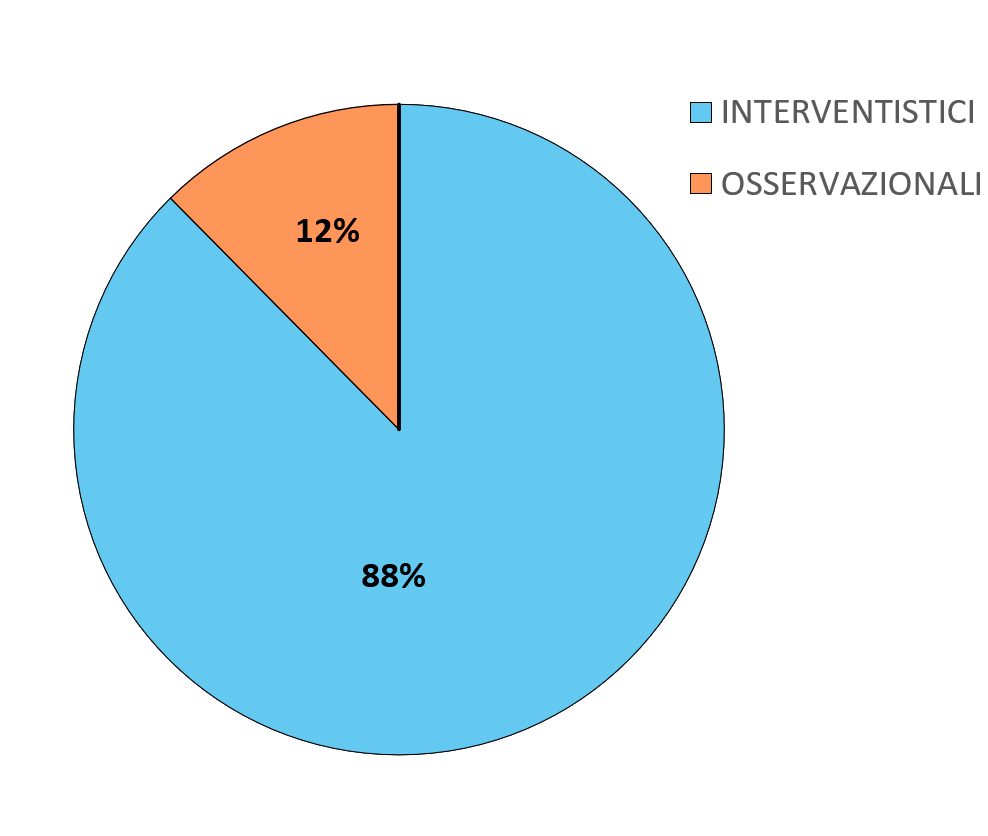
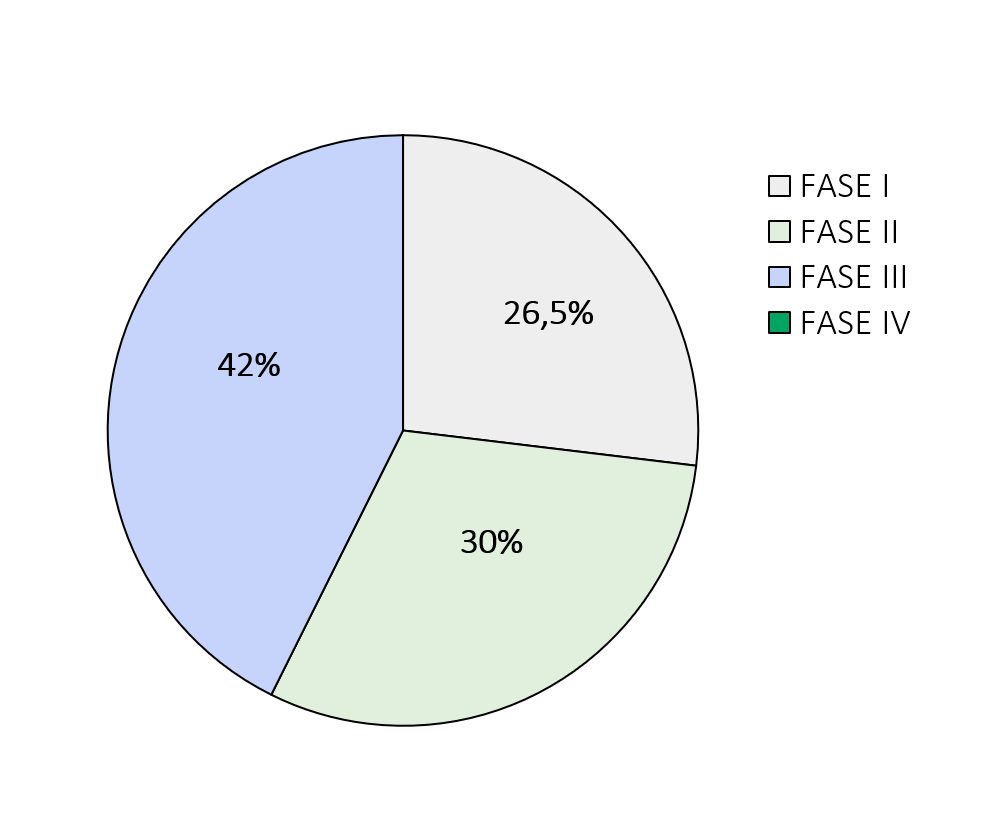
The phases of a clinical trial are:
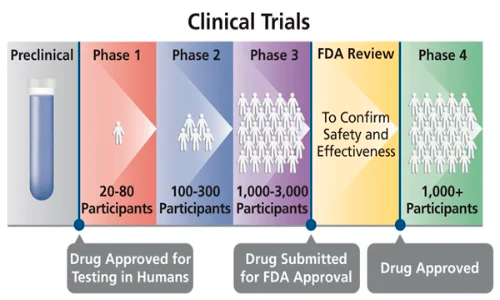
(https://www.thedifferentgroup.com/2020/11/20/studio-clinico/)
Clinical trials are categorized into:
- Profit, promoted by the pharmaceutical industry for profit purposes, whose results become the property of the pharmaceutical industry and can be used for drug industrial development, regulatory purposes, or commercial purposes;
- Non profit, aimed at improving clinical practice as an integral part of healthcare and not for industrial purposes.
Considering the implications for scientific research, professors and researchers in the medical field affiliated with the National Health Service may have the role of Principal Investigator in profit and non-profit clinical trials conducted at the Complex Hospital Structures where they operate, with the necessary involvement of the concerned Hospital Authority and subject to obtaining the favorable opinion of the competent Ethics Committee.
The agreement generally involves compensation for the University, and the contract is of a remunerative nature.
For further information regarding procedures and regulatory references, please contact:
Legal and General Affairs Office - This email address is being protected from spambots. You need JavaScript enabled to view it.
- Details
- Written by Andrielli Gianluca
Delegate for Erasmus Program
This email address is being protected from spambots. You need JavaScript enabled to view it.
Erasmus Office
This email address is being protected from spambots. You need JavaScript enabled to view it.
Welcome Office
This email address is being protected from spambots. You need JavaScript enabled to view it.
The Buddies of our Department (student collaborators for welcoming and orientation, incoming and international students, as well as orientation and tutoring activities for students of the University intending to apply for outgoing mobility grants) are:
PAPAIANNI Martina - This email address is being protected from spambots. You need JavaScript enabled to view it.
DELOGU Matilde - This email address is being protected from spambots. You need JavaScript enabled to view it.
FILIPPELLI Rosalia - This email address is being protected from spambots. You need JavaScript enabled to view it.
MEINERI Alice - This email address is being protected from spambots. You need JavaScript enabled to view it.
You are invited to contact these students (BUDDY) for assistance or supervision in carrying out a period abroad with Erasmus.
- Details
- Written by Andrielli Gianluca
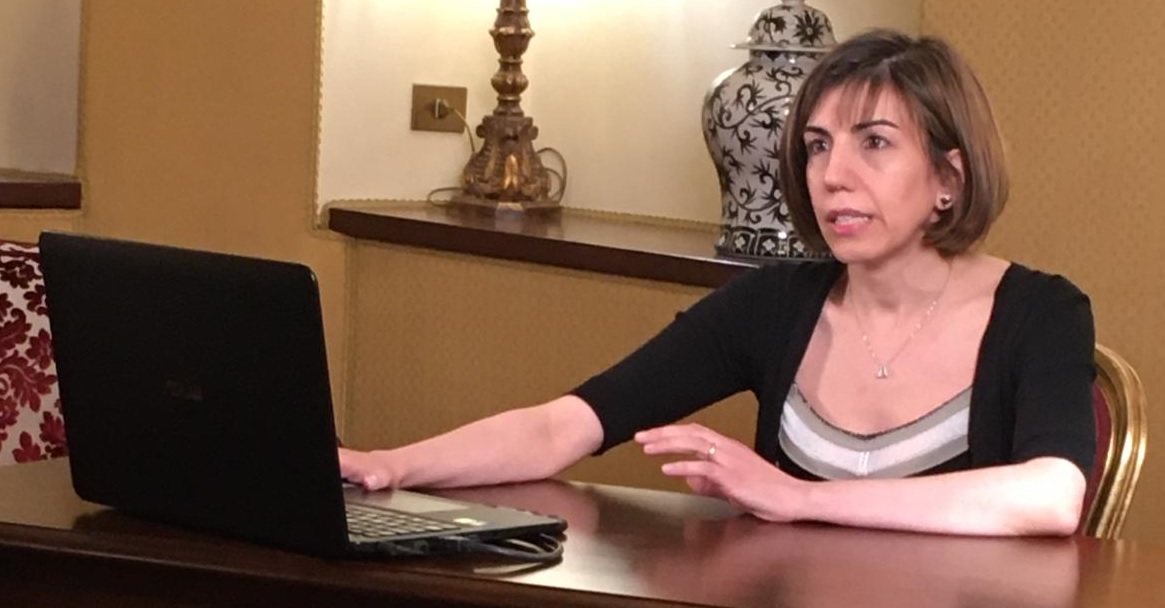 |
Prof.ssa Cinzia COSTAUnicode: This email address is being protected from spambots. You need JavaScript enabled to view it.
|




